Have you ever wondered what living on a boat would be like? Do you want to find out the realities of becoming a full-time liveaboard?
After living aboard for five years on two different-sized sailboats while at anchor, on a mooring, and also in various marinas, I'm in an excellent position to answer all your questions.
Fair warning... this is a monster post so you might want to bookmark it so you can revisit it if you don't manage to finish it in one go!
Living On A Boat: The Key Points
The Advantages (PROs)
- Flexibility of choice for so many things
- Having pets aboard is possible
- You’ll learn a whole new set of skills
- You can live on a boat year-round comfortably
- You become more responsible for yourself and less reliant on others
- Awareness of your surroundings and the weather increases
- It can be like living on land
- Social life can be great if you put in the effort
- Can work when living on a boat
- Internet access is no problem
- The freedom it gives you
- There are plenty of options available for educating your children
- It's a much cheaper way of life
- It’s a simpler, slower pace of life
The Disadvantages (CONs)
It's a small space
Can take time to adjust to life onboard
It can be a very steep learning curve
Have to deal with ‘crappy’ situations at times
Can be isolating
The movement can take some getting used to
Privacy is a thing of the past
Re-adjusting to life on land after travelling is hard
Living on a boat is not at all like I expected.
I moved onto the boat thinking it was going to be like glamping (glamorous camping!) but it’s so much more than that – let me explain…
After reading this blog post, I want you to be able to visualise what it would be like to live on your own boat and have a really clear expectation of what it would be like so that if and when you choose to move onboard your own boat, there won’t be any nasty surprises.
Types of Boats You Can Live On
Just like houses, there are lots of different types of boats available to buy. Some of them are definitely better than others, though it really depends on where you want to live (coastal, lake, river, canals), and, your intentions to move around or if you just want to leave the boat moored in one spot.
If you want to live in a coastal area and move from place to place then a sailing yacht, catamaran, motorboat, or a trawler would be much more suitable.
If you want to live on a canal system, then you'd probably want to look for a narrow or wide beam barge, or a Dutch barge for example.
If you want to live on a lake then you have a wider range of choices as the vessel you choose (probably) won't be subject to conditions as extreme as those that are faced at sea. Make sure you check the depth of the lake you're planning on living on so you don't buy a boat with a deep keel if it's only shallow.
As we lived on sailboats in coastal areas, that's my area of expertise and what I'll be sharing information about in this post. A lot of the information will probably still apply though even if you wanted to live on a different type of boat.
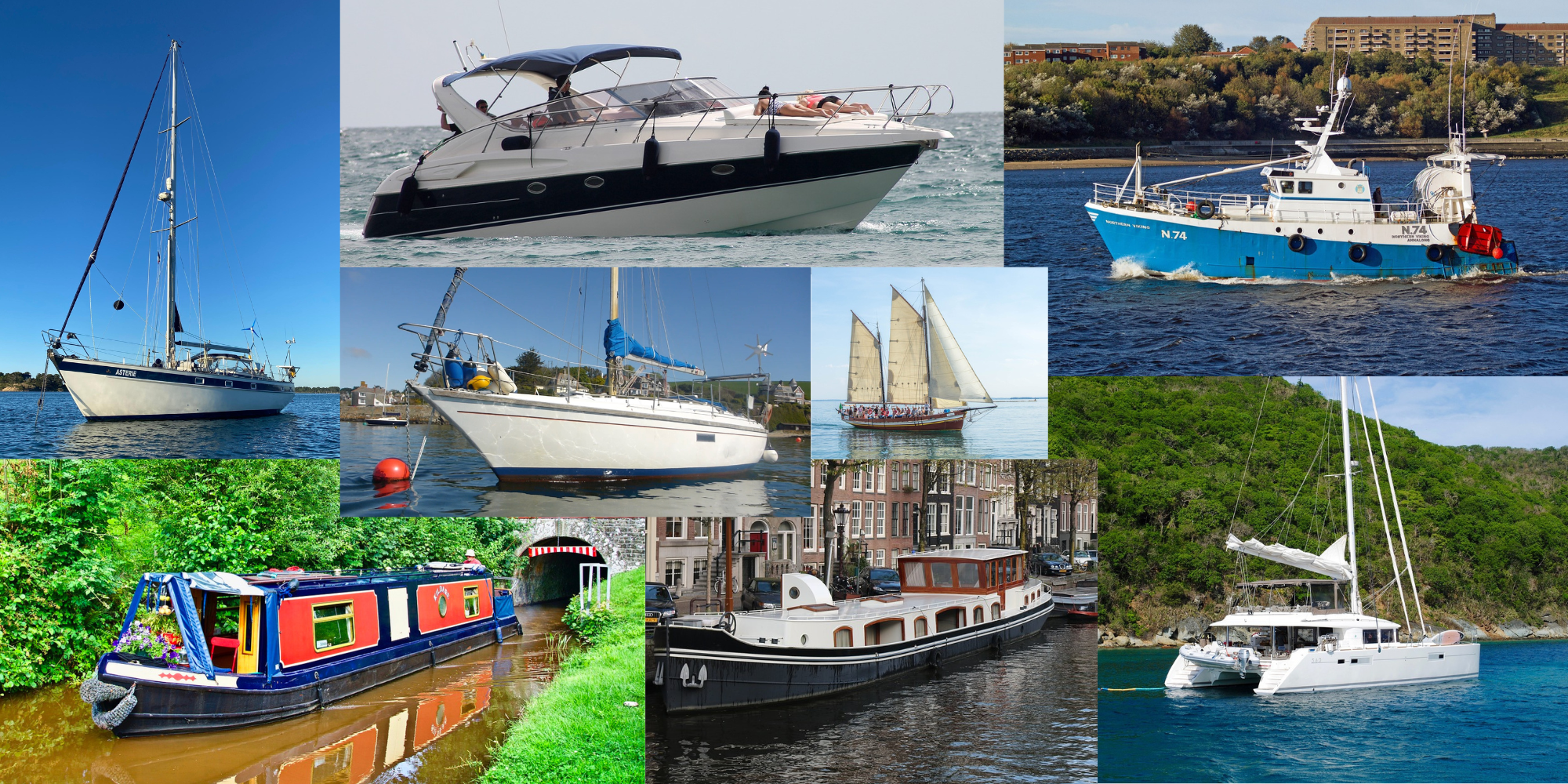
Things to Consider Before Buying a Boat and Moving Aboard
Before you even begin looking at what boat to buy, you'll need to ask yourself a few questions...
Who'll Be Living On The Boat?
The first of these is 'How many people will be living aboard?' This will have a big effect on the size of the boat you'll need to buy, if it's just going to be you, then great! You can go as small as you'd be happy with (space-wise).
If there are more people, then you'll have to make sure there are enough berths (beds) for everyone to sleep at night. Also, think about the ages of those who'll be onboard and their comfort levels. Younger children can be fitted into smaller bunks, teenagers will need longer berths. Couples will probably want a double berth so they can sleep together.
Some boats can transform their spaces. We were able to convert our sitting/dining area into a second double berth and the seat opposite turned into a single berth if needed if you removed the back cushion.
Think about if you're happy to convert bunks every night or if you want everyone on board to have a fixed berth that they can go to for privacy whenever they need to.
Personally, I wanted everyone to have a fixed berth and a door they could close for privacy which is one of the reasons we changed boats.
Our first boat was 34 ft / 10 metres in length. This is because there would be two of us living onboard and a small dog. It had one cabin which was a v-berth at the front where we slept and a pilot berth behind the chart table. Technically, our boat could sleep 6 with all the bunks converted in the dining living area, however, it would have been incredibly cramped with 6 people onboard. For us, it was perfect with just the two of us and our miniature Jack Russell onboard.

The layout of our first boat, a 1974 Dufour 34. You can see how the living space converts into bunks. Image: SailBoatData.com
When we got pregnant, we decided to upgrade to a bigger boat to give us more space. Our second boat was 42 ft / 12.9 metres. It had two cabins this time (one v-berth for two people, and an aft cabin which had a small tapered double and a single berth) and you could still convert the bunks in the living/dining area. It was perfect for two adults, a baby, and a dog (but technically could have slept 8!)

The layout of our second boat, a 1989 Hallberg-Rassy 42E. She had two cabins, one fore, one aft. Image: SailBoatData.com
You'll need to consider the amount of storage space you'll need per person for clothes, toys, and personal belongings (downsizing before you go is key!). Read Why You Should Sell It All and Sail Away if you need a nudge in the right direction.
You'll also want to set aside storage for tools, spares, provisions (food and drink etc), entertainment, bedding, and whatever else you want to have onboard. Amounts for each of these will again depend on your cruising style... you won't need to store anywhere near as many provisions or spares if you plan to remain in a marina all the time versus anchoring out and doing longer passages).
Families have lived aboard and done extensive ocean passages on boats less than 30 ft long so living tiny on a boat can be done if you want to.
Where In The World Do You Intend To Live?
Will you be in a warm climate or a cold one? Tropical or dry?
Warmer climates will need boats with good ventilation to help keep you cool. You'll also be able to spend more time out on deck enjoying the weather and hopefully swimming in warm, crystal-clear waters!
Things I'd recommend looking for in a boat to be kept in warmer climates: lots of opening hatches, deck space to relax on, and a swim platform (or at least a way to get in and out of the water easily), NOT teak decks - it gets WAY too hot below decks if you have teak. Our second boat had teak and while it was great in the UK, by the time we got further south to Portugal, it was too hot to walk on in bare feet and turned the inside of the boat into a furnace with the sun on it all day.
In colder climates, you'll probably be more interested in keeping warm and dry and spending more time indoors, below decks.
For a boat to live in in colder climates, you'll want something that has good insulation, heating, and space for a dehumidifier. Good grip on deck is (in my opinion) even more important in colder climates, you may get ice on deck, and you REALLY won't want to fall into the water in a cold climate.
If you plan on travelling then you'll have to decide what's more important to you and where you'll be spending most of your time.
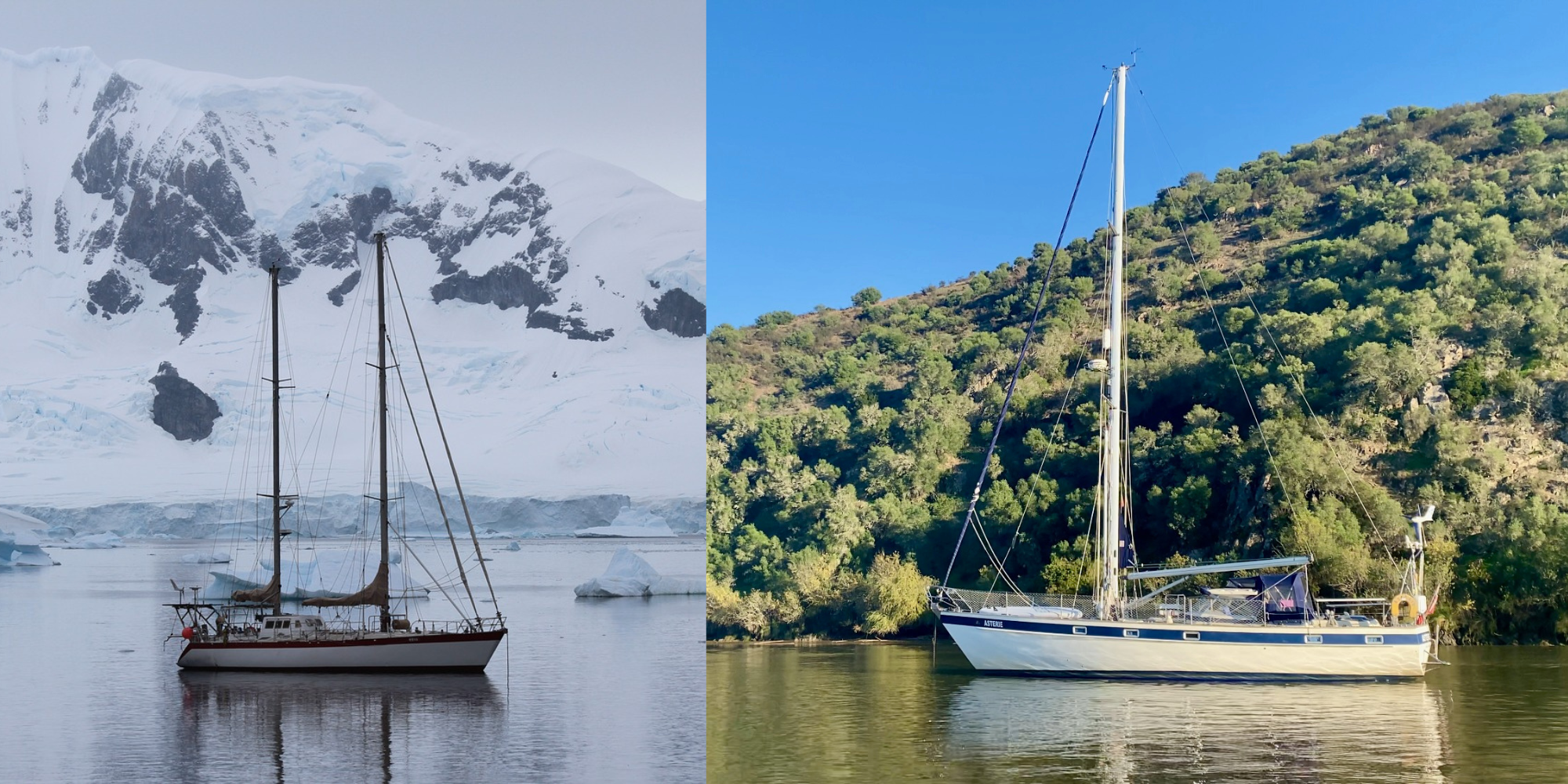
In a Marina, On a Mooring, At Anchor, On The Hard?
Have you thought about where you'll keep your boat while you're living on it?
The four main options... in a marina, on a mooring ball, at anchor, or on the hard.
Now I haven't lived on a boat while it's been up on the hard out of the water in a boatyard (but I think some people do do this!) It wouldn't be something I'd do personally but it could be done out of necessity.
I have however lived on a boat while in a marina, out on a mooring ball, and also out at anchor. We spent four out of five winters living in various marinas in the UK, the Channel Islands, and Portugal. Our fifth winter was spent at anchor up a stunning river between Portugal and Spain.
A lot of marinas offer six-month winter contracts which are a lot cheaper than keeping your boat in a marina year-round. It gives you the best of both worlds (in my opinion). You can travel and explore during the warmer months when the weather is better, spend time at anchor (which is free most of the time) or rent a mooring ball before heading into a marina over winter to hide from the bad weather, have easier access to unlimited hot showers, shops, and a tight-knit community.
Our first summer, we hopped from marina to marina and spent a few nights anchoring. Our second summer we rented a mooring ball in Falmouth and spent time exploring the local area. We also spent the summer boosting our confidence with anchoring and spent more and more time at anchor as the summer wore on. By the third summer onwards, we spent the majority of our time at anchor, only going into marinas if we had to. It gave us a lot more freedom, peace & quiet, and was our favourite price... free!
Of course, you also have the option of getting an annual contract in a marina if money is less of an issue or you want an easier life.

Berthed in a marina - on a mooring ball - at anchor
It's a Very Small Space
First and foremost, a boat is MUCH smaller than a house so you will have a lot less space at your disposal.
A lot of the space inside a boat is taken up with cupboard space and each area is already predetermined with what it’s going to be. Your sofa/seating area is where the designer put it and moving it is generally not an option on your typical boat. Same with your bed in your bedroom. It’s built-in (and also generally an awkward shape.)
There is never much floor space (unless you have enough money to buy a massive boat – I’m talking millions here). It’s generally just enough to walk on to move around the boat. This can make it challenging at times when you have children on board but you just have to learn to be inventive instead with where they play.
Imagine living in the space of one room of your house but everything has to fit in there – your sofa, your dining room table, your kitchen, a pantry, your bed, your toilet, a chart table, and engine, lots of tools and spares, a bookcase and anything else you need to live and you won’t go far wrong.
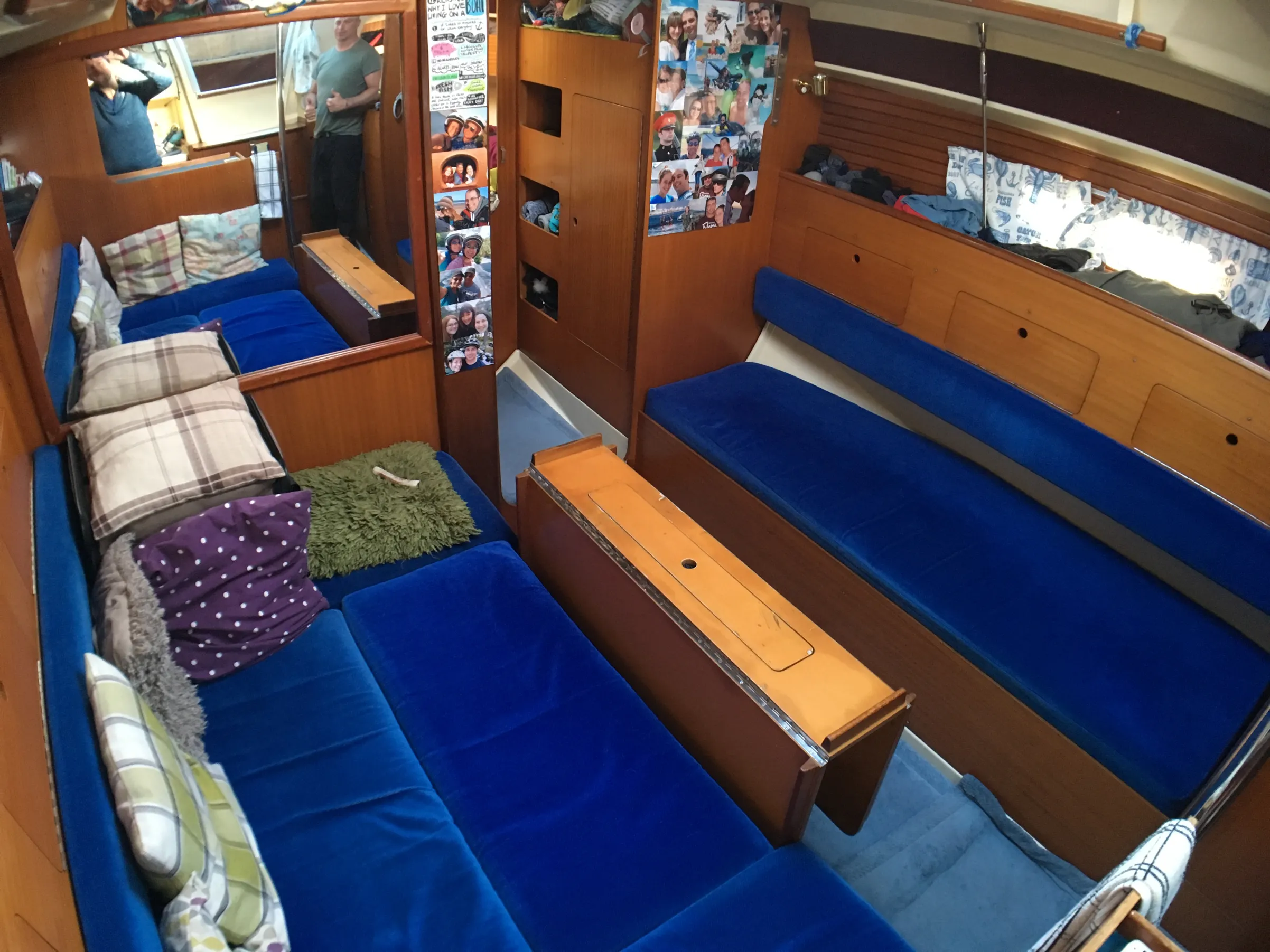
This was our living/dining area on our 34ft sailing boat (with the insert in to make a 'double bed'). If you look in the mirror, you'll see me taking the picture (while standing in the galley, and Dave next to the chart table & pilot berth. Our toilet room was opposite the wardrobe you can see and our v-berth cabin was literally next to that. It's a small space!
What Is A Good Size Boat To Live On?
If you asked 100 people this question you'd probably get 100 different answers.
I can only answer from my point of view and from my experiences.
We were fairly comfortable as a couple with a small dog living on a 34 ft/10m boat. If we'd had a more modern design then we could probably have got away with a slightly smaller boat, maybe 32 feet could have been doable as they extend the width further aft giving you more space.
As a family of three plus a dog, we were again comfortable on a 42ft/12.9m boat. With a more modern design, we probably could have got away with around 38 feet for the same reason as before. I doubt we'd have had anywhere near as much storage though.
There are families the same size as us on boats much larger. SV Delos for example have a 53-foot Amel Super Maramu and they have everything they could possibly need on board including a washing machine, multiple fridge/freezers, a much larger solar array, and a bigger dinghy etc. They spend the majority of their time at anchor and in isolated places so their priorities are completely different to ours.
In an ideal world with money no object, I'd have a 55-foot catamaran built to cross oceans and a much comfier motion at anchor (ROLLING: BE GONE!) but that would come with a much heftier price tag, much higher monthly running costs and the maintenance bills to go with it. Marinas usually charge 1.5-2x more for catamarans as they take up so much more space. Another thing to consider is the cruising ground. The UK and Northern Europe aren't really set up to take large catamarans from what I remember so we'd have to spend a lot more time anchoring and dingying ashore if we had that sized boat.
As a compromise, I'd probably choose a 45-50ft monohull so we had extra space and more conveniences but could still get into the majority of marinas in the UK and Northern Europe and try not to increase the monthly running and maintenance costs too much.
Choosing a boat is very much a lesson in compromise!
Do You Plan To Move Aboard With Any Pets?
When we decided we were going to sell up and move aboard, we had a 2.5-year-old miniature Jack Russell. He was very much part of our little family and was not going to get left behind. There are plenty of sea dogs around the world and Scrappy was going to become one of them.
We also had a pet rabbit at the time and decided that the best thing for him was to find a new home for him as we didn't think he'd adjust very well to life onboard. I was heartbroken. We found him a lovely new home (and a girlfriend) and got lots of updates from his new owner (which made me feel a little less guilty) until he passed away a few years later.
Since moving aboard we have discovered all sorts of animals that live aboard boats, from dogs and cats, to guinea pigs and parrots.
If you intend to travel with your pet then keep in mind you'll need to deal with extra paperwork such as Pet Passports or Pet Health Checks, rabies vaccinations, flea treatments etc. Some countries make it so difficult or expensive to enter with a pet that you may have to change your intended route.
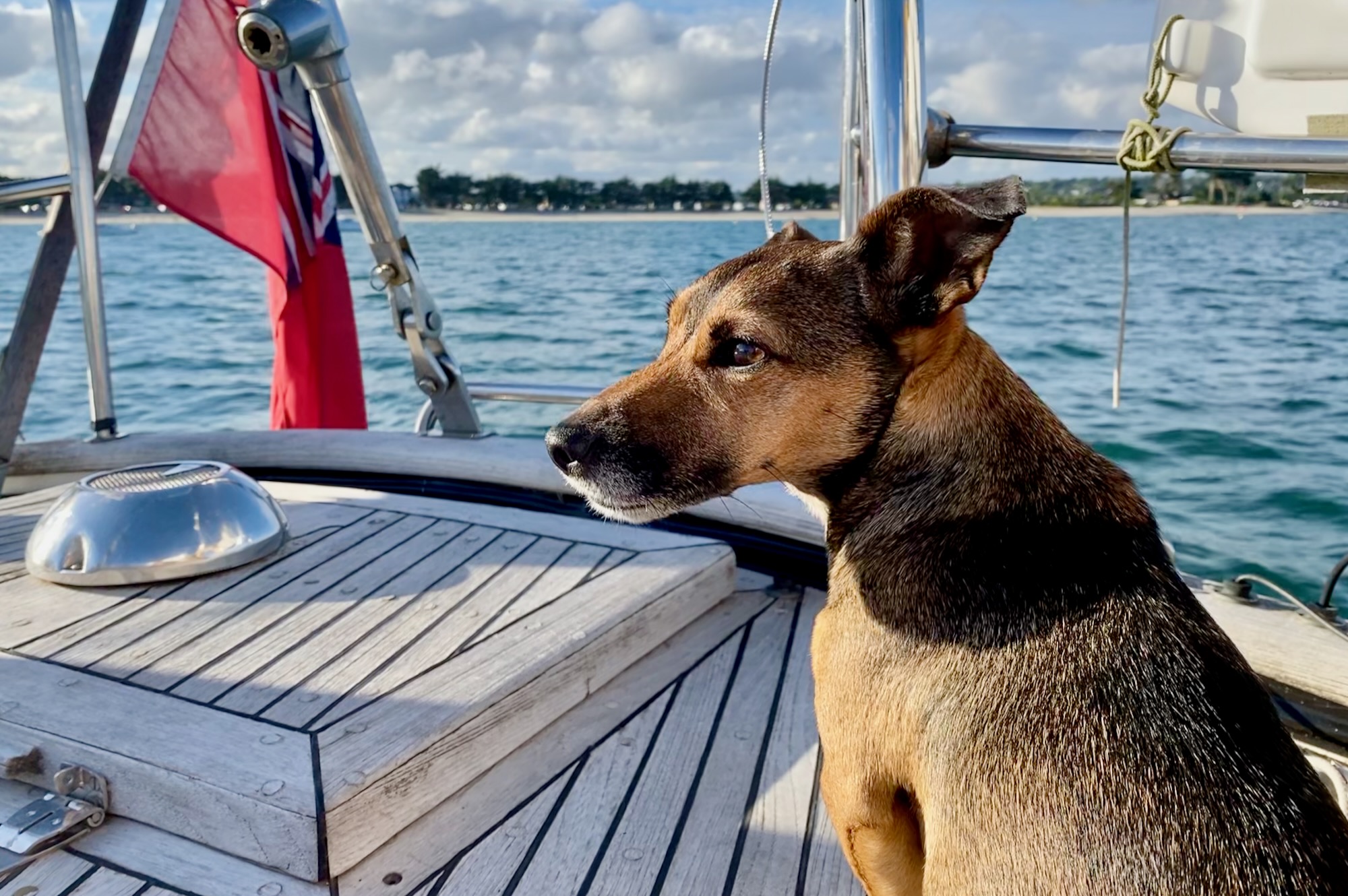
There was no way this little guy was getting left behind! He adjusted to life onboard incredibly well and loved going out and exploring new places all the time.
Do You Need Permission to Live Aboard?
If you live on the canal system then you'll usually need a boat license. More information about that can be found on the Canal & River Trust website.
If you live on the coast then you won't. However, some marinas don't like full-time liveaboards and won't let people stay in the marina full-time. Some openly advertise liveaboard berths such as Milford Haven, Wales. Other marinas turn a blind eye, especially if you're only there over winter. We came across plenty of full-time liveaboards during our time in various marinas across the UK and Channel Islands.
Can You Live Permanently On a Boat In the UK or Abroad?
In the UK it's definitely possible to live on a boat year-round.
We lived on a sailboat full-time for five years. We spent time in The Netherlands, France, Jersey in the Channel Islands, the Isles of Scilly, the United Kingdom, Spain, Portugal, and Gibraltar.
Interestingly, we found it was easier if we kept moving from place to place and didn't spend too long in any one spot (other than Falmouth in Cornwall). Once we reached Portugal, we ended up having to get temporary residency (thanks to Brexit) to stay in the country for longer than 90 days.
Do You Pay Council Tax If You Live On A Boat?
If you have a residential mooring then yes. If you don't and move around then no!
It's one of the many perks of living on a boat.
The Skills You'll Need and Responsibilities You'll Gain
When you move aboard a boat, you gain a whole new set of responsibilities.
Everything that happens to you is your fault.
Just let that sink in for a minute… (pardon the pun!)
EVERYTHING that happens to you, is YOUR fault.
Once you leave port and are out at sea, getting help if there is a problem is so much harder than when you’re on land. That’s why it’s your responsibility and yours alone to check that everything is safe, secure and in full working order before you leave your anchorage or marina.
From checking the bilge pump works to having the correct safety equipment onboard to doing a visual rigging check – it’s all your responsibility.
Once you’re out at sea (especially when doing long crossings where there is no one close by to help – think hours, days, even weeks sometimes before you can get the help you need), you’re on your own.
I’m not saying that to scare you because that feeling can be incredibly liberating if you look at it the right way.
Take pride in learning to maintain and fix everything onboard. From plumbing issues to woodcare, engine maintenance to sewing ripped sails. If you take the time to learn new skills and be responsible for your own safety, you’ll feel safer and your confidence will grow.
Use a Boat Maintenance Log Book to keep track of any jobs that need doing onboard.
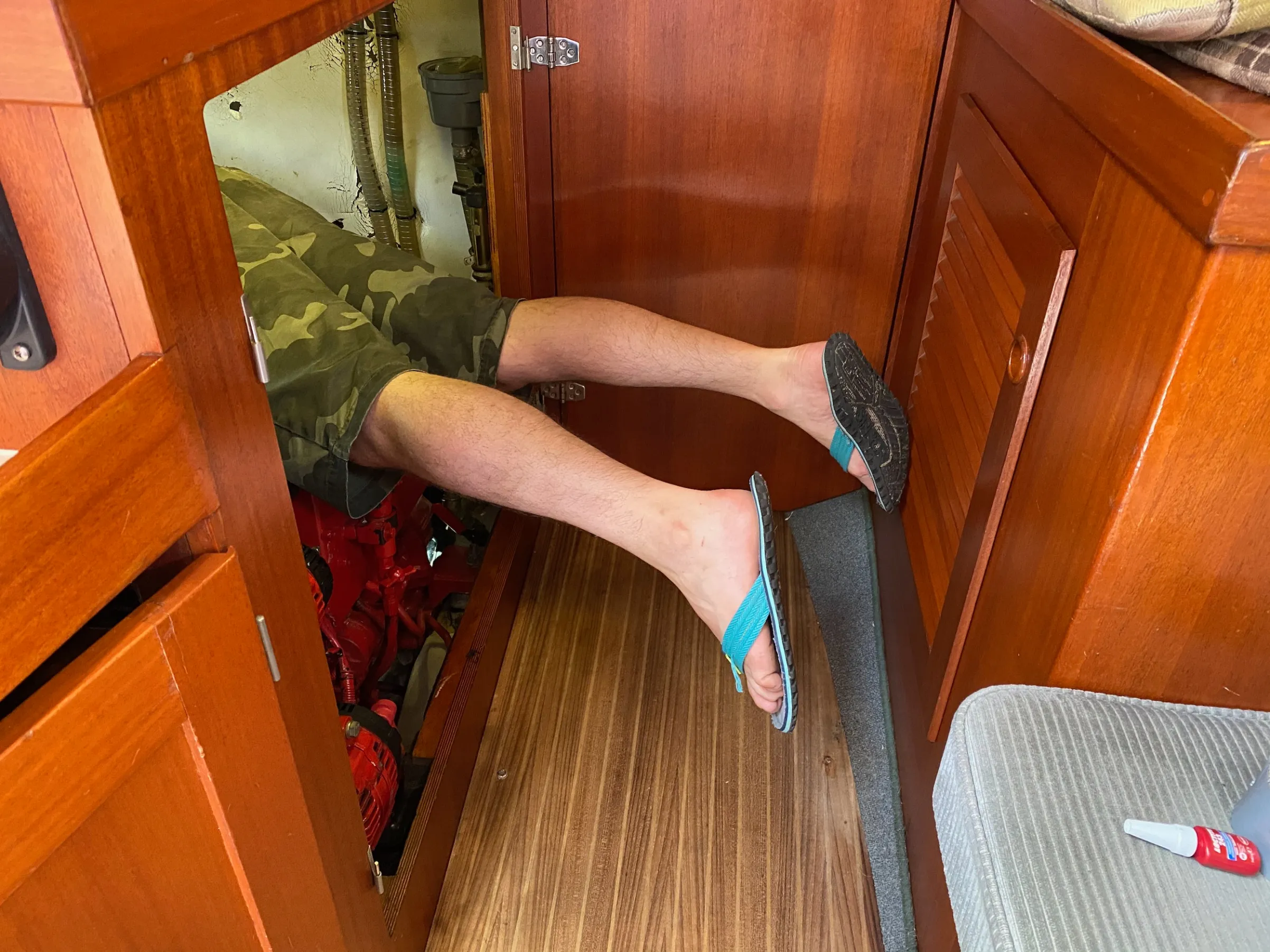
That's the engine room in there. It also housed our hot water and heating systems amongst other things. ^ This happens more than you'd hope when living on a boat... there's always something that needs investigating and fixing. Learning skills to fix any problems that arise will greatly boost your confidence when you leave port.
Boats (and Their Contents) Must Be Multifunctional
Your boat is your home, your transport, your workshop and your workspace (if you choose to work onboard).
It manages all this even though it is quite a small space. You have to be flexible and expect the boat to get turned upside down regularly but as you will have a lot fewer possessions on a boat, it is much easier to tidy up afterwards and return it to ‘home’ mode.
Whenever you bring something new onboard, you quickly learn that it becomes a lot more valuable when it can perform multiple functions as it takes up less space than having things that only do one job.
In your kitchen in a house, think how many gadgets and gizmos you have that only do one job. Do you have any that can do multiple things at the same time? We learned to use our wok to cook pancakes in, our pressure cooker became a steamer too, and a mandolin had multiple inserts so we could use it to thinly slice items, grate cheese, and diced onions into tiny pieces.
Asterie (42 foot/12.9m) was our home and 90% of the time we were stopped, normally at anchor during summer and in a marina over the winter. We could quickly turn her from sailing mode into house mode when items came out of their storage places in cupboards and boxes that kept them safe while we were moving.
She moved us safely from anchorage to anchorage, marina to marina, and came alive when we were out sailing. Travelling by boat is a lovely way to see the world and every person has a unique and different adventure along the way. It’s not like travelling along a road with everyone else. We sailed across Biscay as many, many people have done before us, but, I could almost guarantee that no one else has ever taken exactly the same route that we did, nor touched the same bit of sea which completely boggles my mind!
Dave and I both worked onboard and we designated the front cabin as a place where we could go to work and be disturbed as little as possible. The front cabin was also a bedroom and there was a lot of storage in there too. The chart table also became a workstation for late-night work once our daughter had gone to sleep.
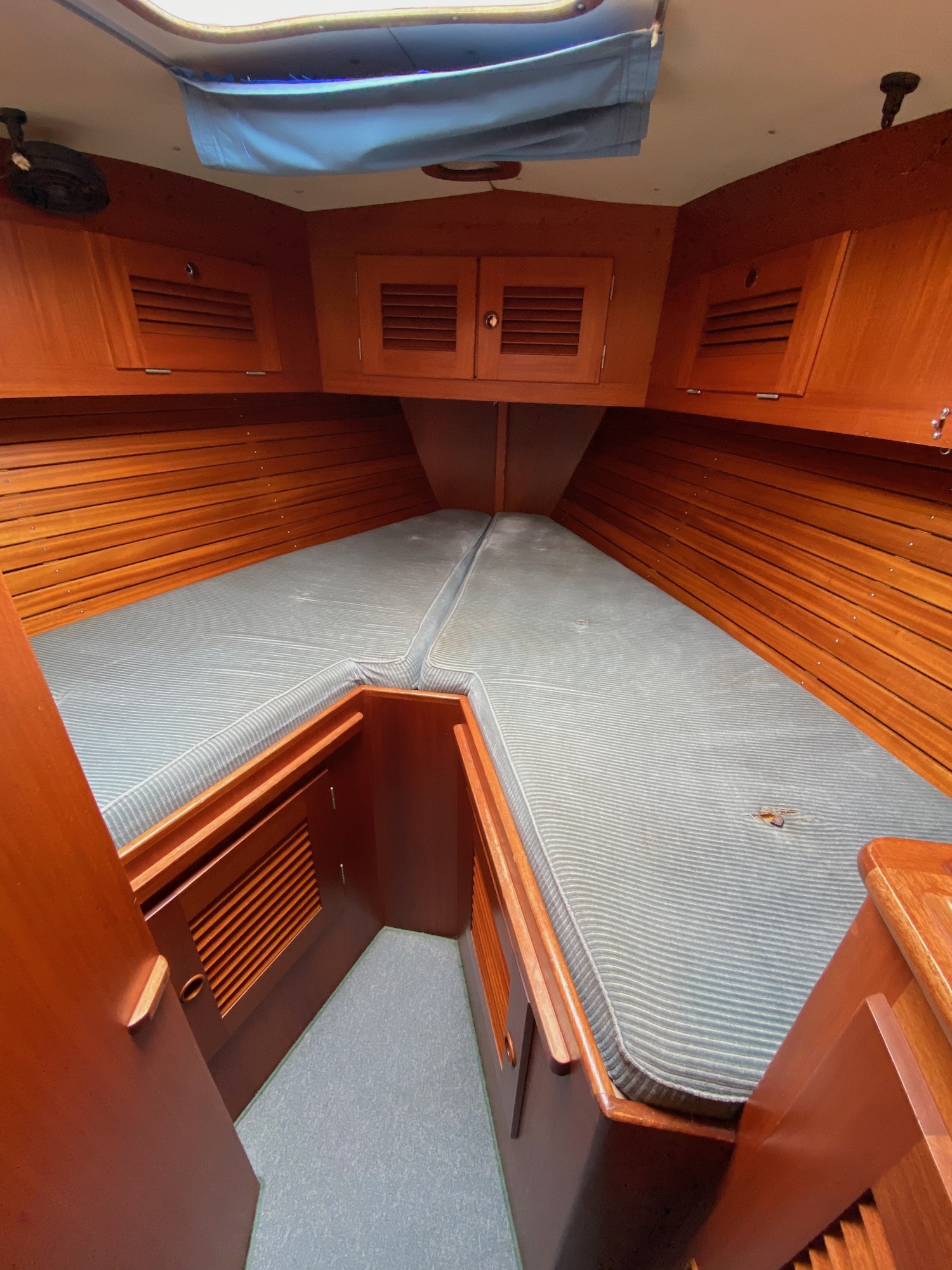
This room was our forward v-berth, workspace, and storage room!
There are always numerous boat jobs that need to be kept on top of. We chose to maintain items as best as we could rather than fixing them when they broke. However, living on a boat and things breaking becomes the norm as living in a salty environment helps things deteriorate and break more quickly. Such is life.
It’s amazing how a boat can be so many different things at once but it makes you realise how little you actually need to live and be happy.
How Long Does It Take To Get Used to Living On A Boat?
This will vary from person to person.
I think it took me a few weeks to start decompressing and appreciating life on board. It took a few months to really settle into the lifestyle as I was also effectively taking a crash course on everything to do with boats. I had to learn a whole new language for all the boat parts, the terms to use while sailing, and also how to actually sail. I jumped in at the deep end quite literally as I had very little experience with boats before we bought one and moved aboard.
The movement onboard was also a new thing for me to get used to. It's really obvious when you first step onboard, even in a marina, but over time your body gets used to it so some days it's barely noticeable at all. When we were onboard during bad weather though with the boat getting chucked around all over the place, I never got used to that, nor the movement while sailing. Unfortunately, I get seasick so had to take sea-sickness tablets to make sure I didn't puke! I highly recommend Stugeron 15 (cinnarizine only), nothing else worked for me or allowed me to stay awake.
Getting used to living in a smaller space also took some time. Not having a car made me rethink how I was going to do everything. I either had to walk, get a lift, or take the bus or train if I wanted to go anywhere. We ended up hiring cars a few times to make life easier which made such a difference, especially when provisioning the boat for months at a time.
If you have previous experience on boats and have spent time on them before or have lived in a small space then you'll probably adjust faster than I did.
Safety and Security Onboard
During a Passage
Boats are designed so that you can move around them safely at sea. There are no big open spaces. On well-designed boats, there are plenty of hand holds and places to wedge yourself against to keep yourself from falling when moving around below decks underway.
Safety on a boat is key. There shouldn’t be anything loose below decks because when underway if anything starts flying around, it can become dangerous very quickly. This is why all those fixed cupboards and items of furniture are built in.
You’ll need plenty of safety equipment on board just in case with the hope that you’ll never need to use it. A life raft, danbuoy, jonbuoy, life jackets, flares, man overboard recovery equipment, EPIRBs (emergency position-indicating radio beacons), PLB (personal locator beacons), AIS (automatic identification systems), radar, and medical kit just to name a few things. It's not all essential but the more of it you have (and you know how to use it), the more prepared you'll be should the worst happen.
Think like a boy scout – always be prepared.
Living at Anchor, On a Mooring, or In a Marina
If you're not planning to travel then it's unlikely you'll need a lot of the above items I mentioned. You will want to protect yourself from people trying to board your boat though.
I'd recommend getting a good lock and locking your boat whenever you leave it. I'd also recommend finding a way to secure the companionway hatch from the inside too while you're onboard. We could only lock our boat from the outside if we went out. Living onboard though, we felt very safe but obviously that feeling will vary from location to location.
Another thing I'd recommend buying (if it's not already on board) is a really good anchor and chain combo. Make sure your anchor is well set and there is enough chain out to account for any rise in tide and change in weather conditions before you leave your boat at anchor. I can't imagine how I'd feel if we went ashore and then came back to find out the boat had drifted away as the anchor had dragged. It will also really help you sleep better at night while at anchor.
Both our boats had CQR anchors when we bought them. I hated them. They are designed to plough the sea bed (and plough they did!). I'd much rather have a modern design that is designed to dig in and stay dug in.
We upgraded our first boat to a Rocna anchor after doing the 'CQR dance' and dragging one too many times. We'd completely lost faith in the CQR. The first thing we bought for the second boat was a Rocna anchor as we spent so much time at anchor and wanted it for peace of mind and a good night's sleep.
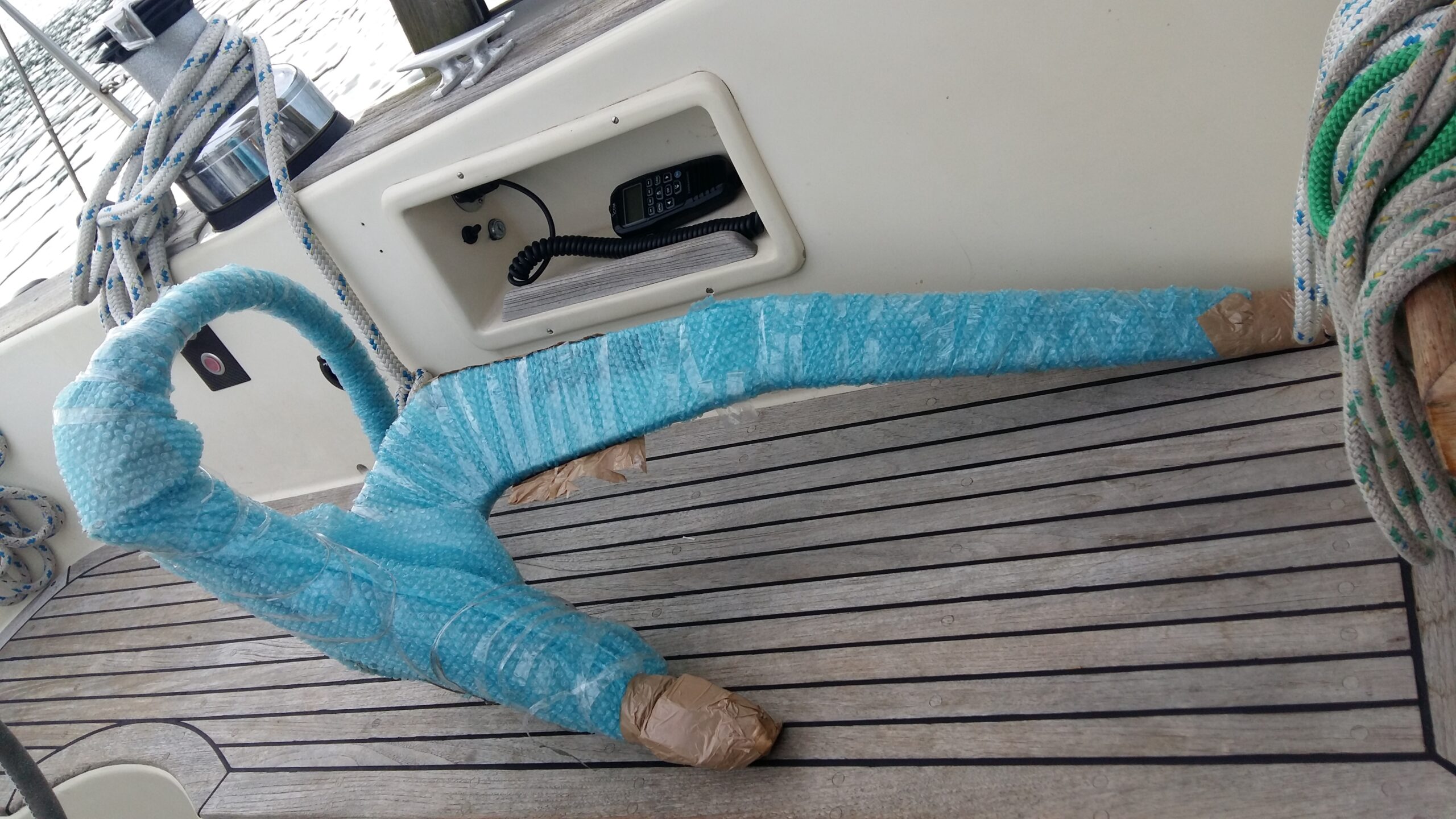
Our brand new Rocna anchor for our new-to-us sailboat. Essential for our peace of mind and safety.
A lot of marinas control access to the pontoons with a locked gate which helps with security as well as having CCTV on site and a night watch guard too.
We always felt safe onboard whether we were in a marina, on a mooring or at anchor. Our view was that if we were at anchor or on a mooring then anyone that wanted to get aboard would have to have access to a boat themselves or be a good swimmer. If we were in a marina then we generally chose ones that had good security for peace of mind.
Daily Life Onboard a Sailboat
How Does Living On a Boat Affect The Environment?
Living on a boat brings you so much closer to nature and will make you think about the effect you have on the environment when living your day-to-day life.
You become aware of how much water you use. (Mostly because you can only carry so much water on board depending on the size of your tanks. Filling them up when you don’t live attached to a dock means picking up the anchor/releasing from your mooring, moving your whole house to a marina or pier that has a water tap, getting all the fenders and lines out and set up, mooring up, digging out your hosepipe and then sitting there while your tanks fill which can take a while if you have big tanks. You’ll also need to be thinking about what the tide is doing at all times then go and find a spot to anchor again while using up precious diesel.) Having to do all that means you start to use a LOT less water each day so you can go as long as possible between water fill-ups.
It also makes you think about the products you use in the water such as in the shower or when washing up because once it's been used, it all goes overboard.
Another thing you realise very quickly is that you have a limited amount of energy in your batteries that you can use to do things like run your fridge or charge your phone etc.
You have three main options to top them up. Sit in a marina plugged into the electricity (boring), run your engine (uses diesel so bad for the environment) or install things like solar panels and a wind generator to generate power from the sun and wind (much better). Guess which option we went for?!
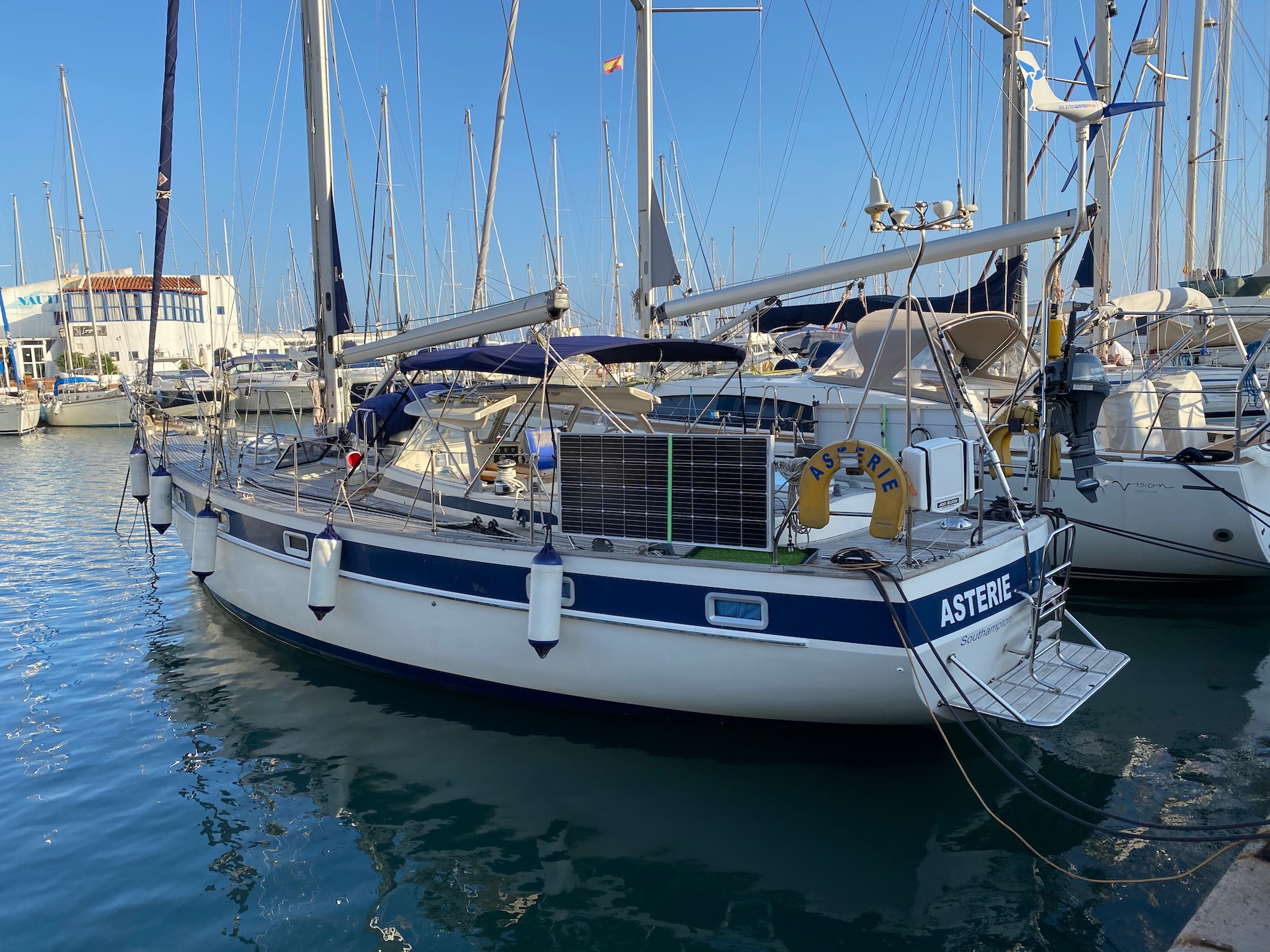
Our first boat already had solar and wind fitted and we loved the freedom it gave us so we fitted solar and a wind generator to our second sailing boat. The solar panels are stowed in the 'sailing' position in the picture, they worked like this but were much more effective when we tilted them up towards the sun. At the time we were plugged into the marina as we were stuck waiting for engine parts before we could leave again.
For cooking, you have a few options: gas, electric and alcohol are the main ones. Electric is the option we’d go for if our battery banks were big enough as electricity is a renewable resource on a boat once you have solar and wind installed.
We used gas and knowing that we'd have to go ashore to replace a gas bottle when it ran out (which could be very challenging to find the right type of bottle), meant we used it for as little time as possible.
Alcohol can be found pretty much all over the world, however, swopping to this would mean replacing the stove that was already on our boat when we bought her which would be a massive expense. And, if we were going to replace the stove, we’d swop to electric, not alcohol.
Take great care when emptying your bilges as all sorts of crap gets caught down there including oils, fuel, bits, dust etc. Try and soak up any fuel and oil spillages before emptying the bilge as anything left will go overboard and affect the local fauna and flora. You can buy Bilge Oil Absorbers which I can only describe as something that looks like a giant tampon.
How Do You Deal With Toilet Waste On a Boat?
Dealing with toilet waste was a new one for us.
Both our boats had holding tanks for toilet waste and a macerator. We chose to only put natural human waste down the heads (toilet) and put all toilet tissue and anything else like sanitary products in a bin that we kept next to the toilet. This took some getting used to at first but quickly became normal. The bin was emptied regularly and had a closing lid on it to contain and minimise any interesting smells.
Toilet pipes are very small and can get clogged very easily, and guess who gets to deal with it when they get blocked? Yep. You! Keeping them unclogged and flowing freely becomes an even higher priority when you realise that! Also, putting toilet roll into the ocean doesn't seem right to me even though I know it will break down eventually.
Just so you know, toilet waste can go overboard when you are more than 3 miles away from shore as the open sea will quickly disperse the contents of the holding tank. Until then, it should really be contained within a holding tank.
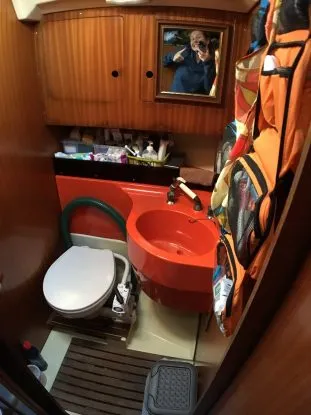
The heads (toilet) onboard our first boat. You can see the bin we used for toilet tissue etc (it's grey!)
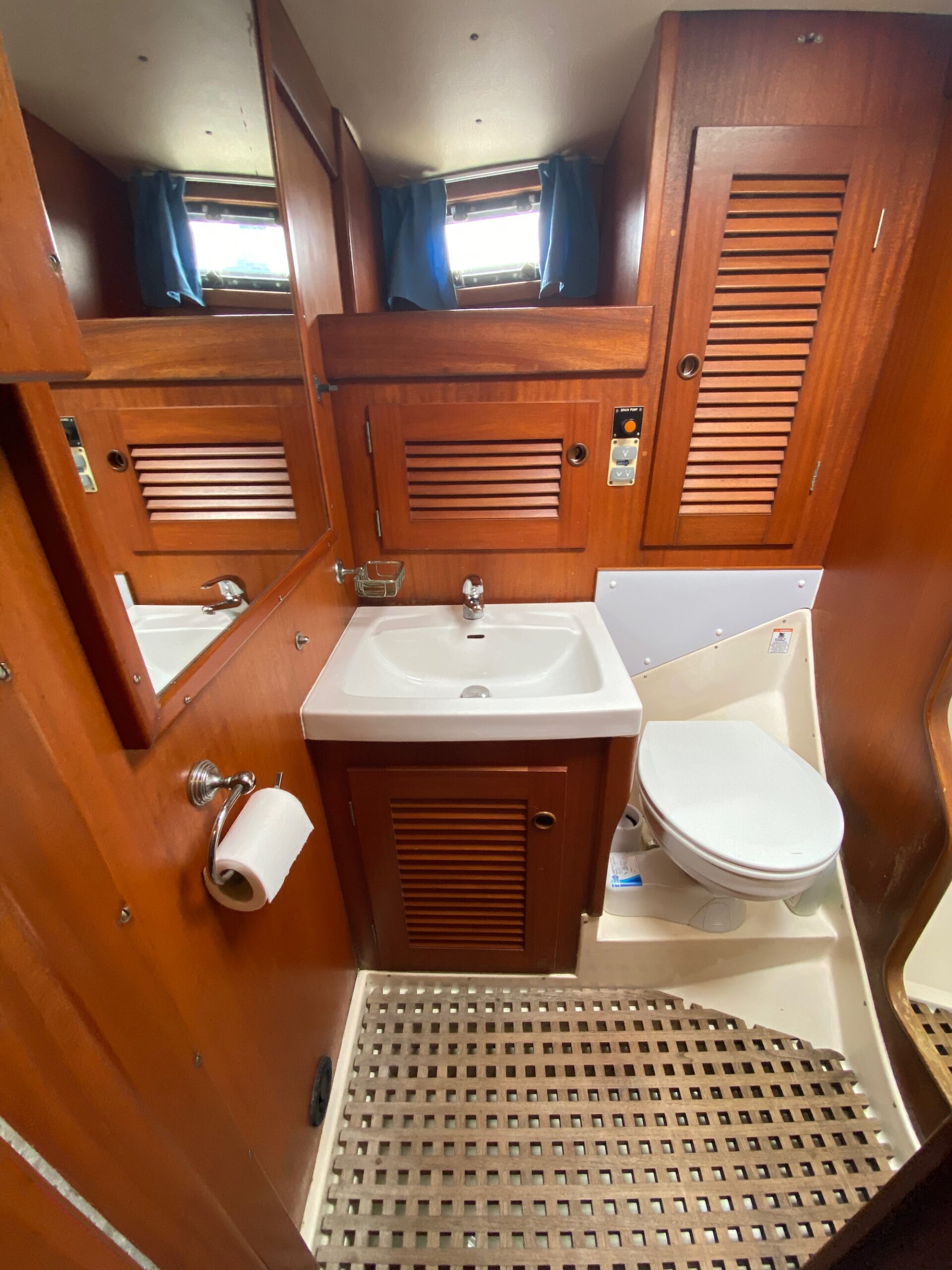
One of the heads aboard our second boat (we had two) which was great as a backup for if one broke.
What Do You Eat When You Live on a Sailboat?
As long as you have a galley onboard then you can eat very well.
We cooked a lot of meals onboard from scratch. Think beef bourguignon, curries, freshly caught grilled lobster, roasted vegetables, roast dinner, pancakes, triple chocolate brownies... We also used tinned food sometimes to supplement our meals (like turning tinned peas into mushy peas to go with fish).
Another thing we did to supplement our provisions was to fish from the back of the boat on passage or from the dinghy. We had some success catching Mackerel and Pollock around the UK, the Isles of Scilly, and France.
I'd recommend getting a boat with a reasonable amount of countertop space so you can cook from scratch. Having an oven, grill, and hobs makes such a difference in what you can cook.
Having a fridge/freezer is very useful (although not essential if you find alternative ways to preserve food). Visit The Boat Galley for some excellent tips for living on a boat with no refrigeration.

Everything pictured here was cooked by me onboard our two sailing yachts. I'm now starving!
Can You Drink Alcohol On A Boat?
Yes! (But I really would not recommend doing so when the boat is in motion or you need to be in full control of any situation that might develop such as when you're at anchor and bad weather is forecast). I always used the drink driving rules as guidance.
We only ever drank when we were safely stopped and secure as we always wanted to be in full control of our boat when it was moving. We had some epic boat parties onboard (including Erin's first birthday 'pirate themed' party) and the previous owner of our second boat said she was known as the 'party boat' of the marina. There was even a bottle top remover mounted to the steps! Need I say anymore?
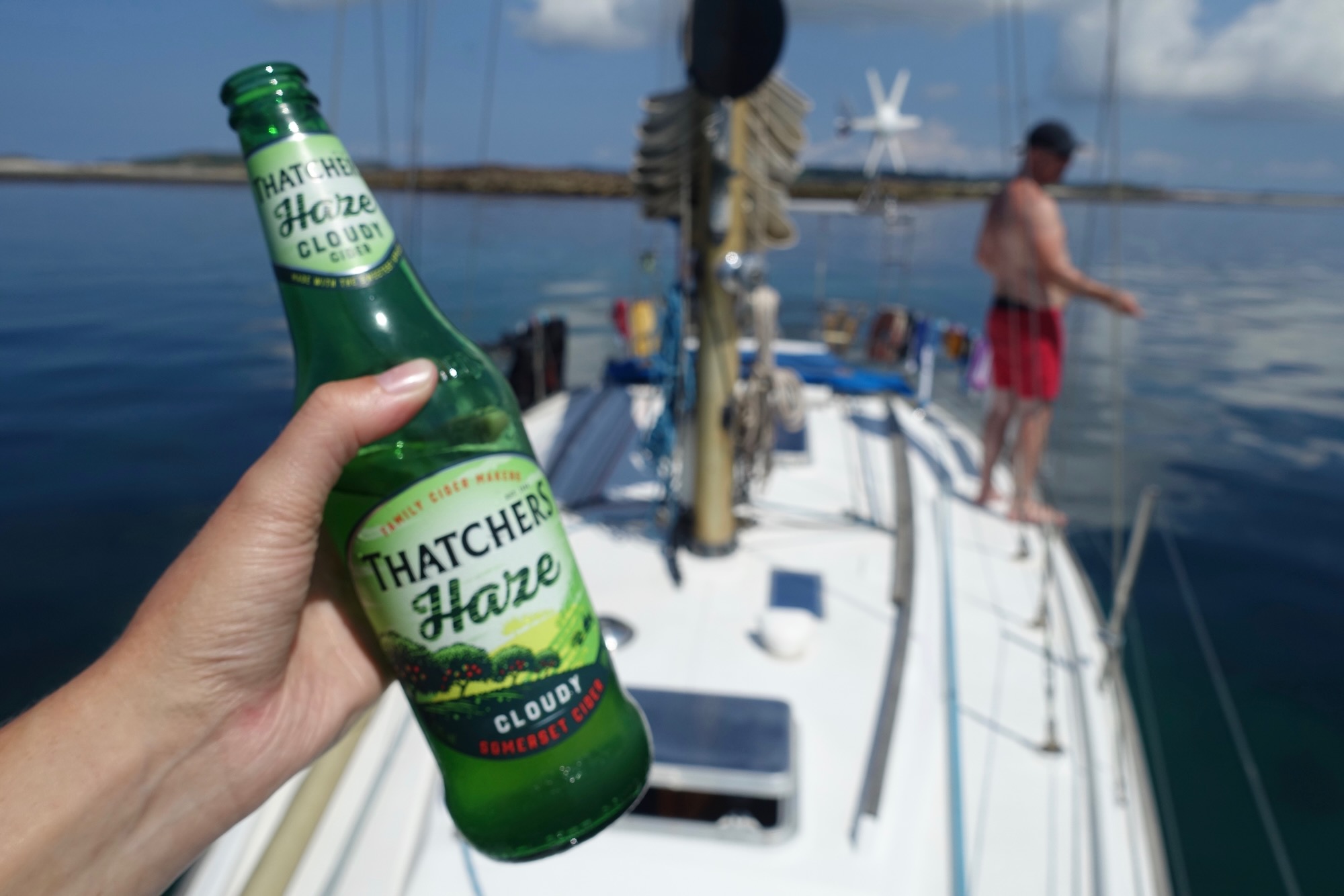
Is Living On A Boat Isolating?
Living on a boat can be isolating. This can be good and bad depending on how you look at it and the effort you put into meeting others.
If you like your own company and spending time alone then this is a great way of life to do that. If you’re out at anchor, there may be other boats around but you’d need to jump in a dinghy or on a paddleboard to go and speak to others (or they might come to you to say hi) or to go ashore.
Having a baby or children onboard can also make you feel quite isolated as you are generally away from friends and family and they can’t just pop around. FaceTime comes in very handy as at least you can see their faces and have a chat but it’s not the same as actually spending time with them. It does make you really treasure the times you do get to see them though.
Socialising When You Live on a Boat
On the whole, cruisers are generally a really friendly, welcoming bunch and when you find yourselves around them, they really help squash the feeling of isolation.
We struck up plenty of conversations and had some unexpected (but fantastic) times socialising with other cruisers.
The first one that stuck out was meeting a Dutch couple in Dunkirk who were standing at the bow of our boat when I came back from the showers. I said hello and they said they had exactly the same boat berthed a little further down the pontoon. We ended up going on each other's boats to have a look and then sharing a typical Dutch drink onboard their boat.
While in the Isles of Scilly, we were invited to a beach BBQ one evening after holding up a couple of pollock I had just caught to a couple going past in their dinghy. They did a 90-degree turn to come over and say hello and invited us to go that evening along with a few other couples.
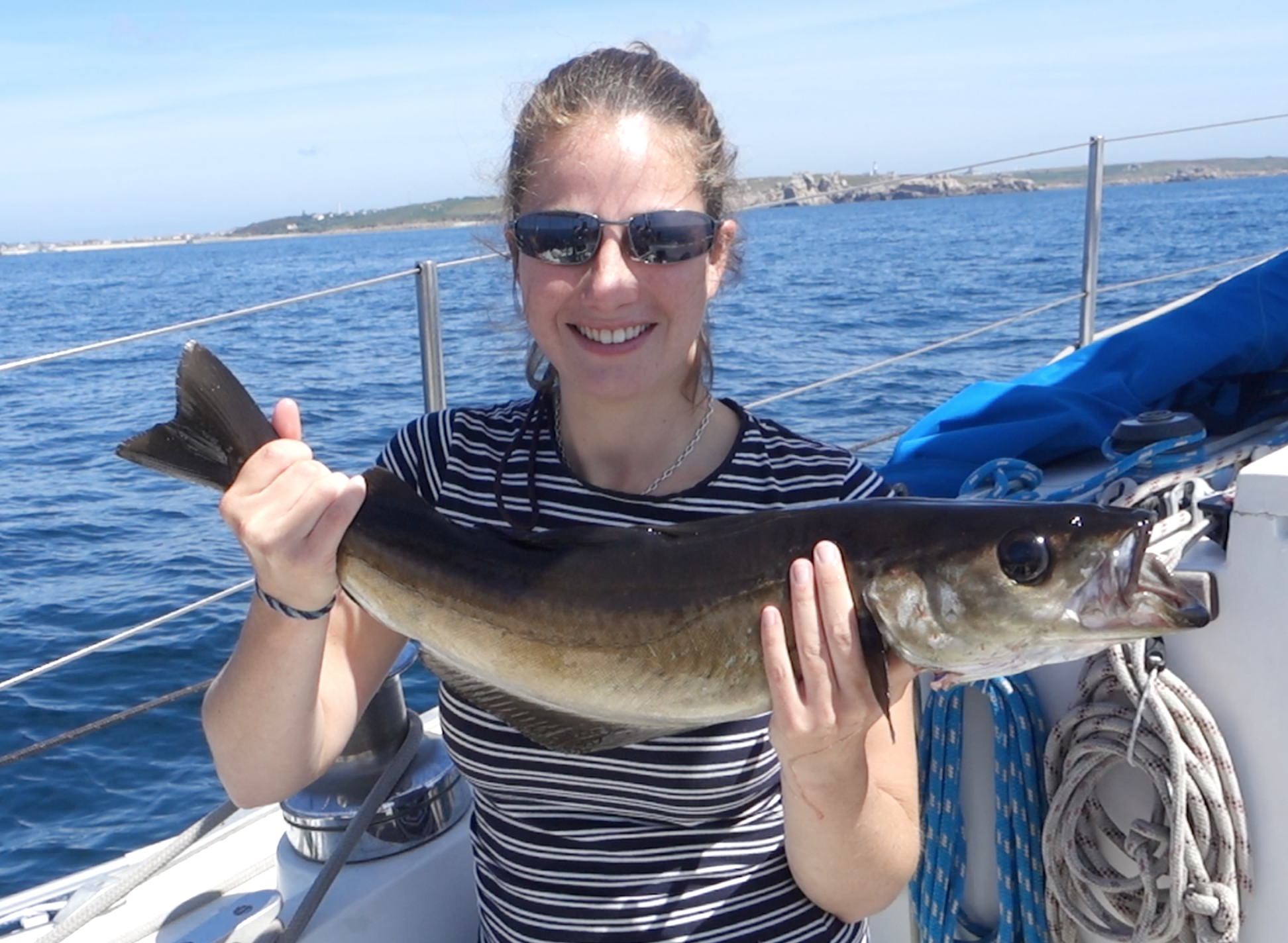
One of the pollock I held up that got us an invite to a beach BBQ and an epic evening ashore with some sailors we were sharing the anchorage with.
I prepared and took the pollock, the other couples raided their stores and we all contributed to a very memorable meal. Afterwards, we ended up in the pub on the island which led to a very late night and interesting dinghy ride back to our boats!
From that one evening, we made fast friends with another couple who also had a dog onboard and met up many more times over the following weeks there and also the following season when they came to Falmouth where the conversations continued as though they hadn't stopped.
We found that when we settled down for a winter in the Algarve in a marina, we spent more time socialising than we had done for a long time (having a newborn and COVID-19 definitely hadn't helped since our daughter was born) and are still in touch with many of the cruisers we met during that winter.
Getting away from the UK helped (weirdly) as everyone was in the same boat being away from family and friends back home, so the majority wanted to find new friends to spend time with.
In a marina, if you want to socialise and spend time with other people, walking along the pontoons to see who’s sat in their cockpit is always good as nine times out of ten you’ll end up striking up a conversation. On the other hand, if you don’t want to socialise then you don’t have to.
To sum up socialising when living on a boat... our social life took off once we moved onboard and made the effort to connect with other cruisers. We now have friends worldwide and made better connections with other cruisers than we ever did with friends back home pre-cruising.
Can You Work If You Live on a Sailboat?
Yes!
Many, many cruisers live and work while living on boats.
You can choose to keep a job on land and commute each day as though you were living in a house. I know people who live in marinas and also saw others living on a mooring ball and commuting ashore by dinghy.
You can work remotely onboard if you have a good job and your employer allows you to, and a decent internet connection.
You can work as a freelancer online, invest, or build up another kind of online business if you have the skills.
Just because you choose to live on a boat doesn't mean you can't work and earn money.
Can You Get Access to the Internet on a Boat?
Absolutely!
You have multiple options to get online while living on a boat these days.
Use the marina WiFi if available (you may need a booster depending on how far you are from the signal).
Use your mobile phone contract and set your phone up as a personal hotspot.
Pay for a data-only monthly mobile broadband sim card and put it in a router. We get 5G unlimited internet from Vodafone each month for £37 per month on a rolling 30-day contract. We just need to buy a 5G router now as we currently only have a 4G one.
For high-speed internet almost anywhere in the world... consider Starlink. They have various packages on offer for inland locations or for while at sea, but, it is the most expensive option. If you don't want to sort out SIM cards for every country you visit or want to have internet while you're out at sea, then this may be the best option for you.
What's The Movement Like Onboard?
When you move aboard a boat, your whole world starts moving. It’s strange to get used to to begin with as you notice every tiny movement of the boat. The smaller the boat, the bigger and faster the movement.
When you’ve been living on board for some time, you get so used to the movement you don’t even realise it’s happening. The gentle rocking helps you go to sleep at night and it really helps with getting babies to sleep too. I looked up at the mast when I was putting Erin to bed one night and we were gently rocking from side to side yet I could barely feel the movement at all. What makes me laugh is that the bigger the movement, the happier Erin was. She truly was a boat baby!
Getting used to the movement when sailing is a whole different ball game. Learning to live life on the lean takes some getting used to. In all honesty, I’m not a fan of being tipped over so we tend to sail with less sail up than we need to keep the boat sailing flatter.
In choppy seas the movement can make it feel like you’re in a washing machine at times (which in my case is puke-inducing). Lucky me. Hopefully, you’re one of the lucky ones who doesn’t get seasick as it can be quite debilitating at times (just to pre-warn you). I spent most of the English Channel crossing lying on the bedroom floor trying not to throw up and failing miserably at times. All while trying to look after Erin as well. Fun times.
Sailing has many ups and downs, movement is one of them. Sometimes it’s great, other times it really isn’t.
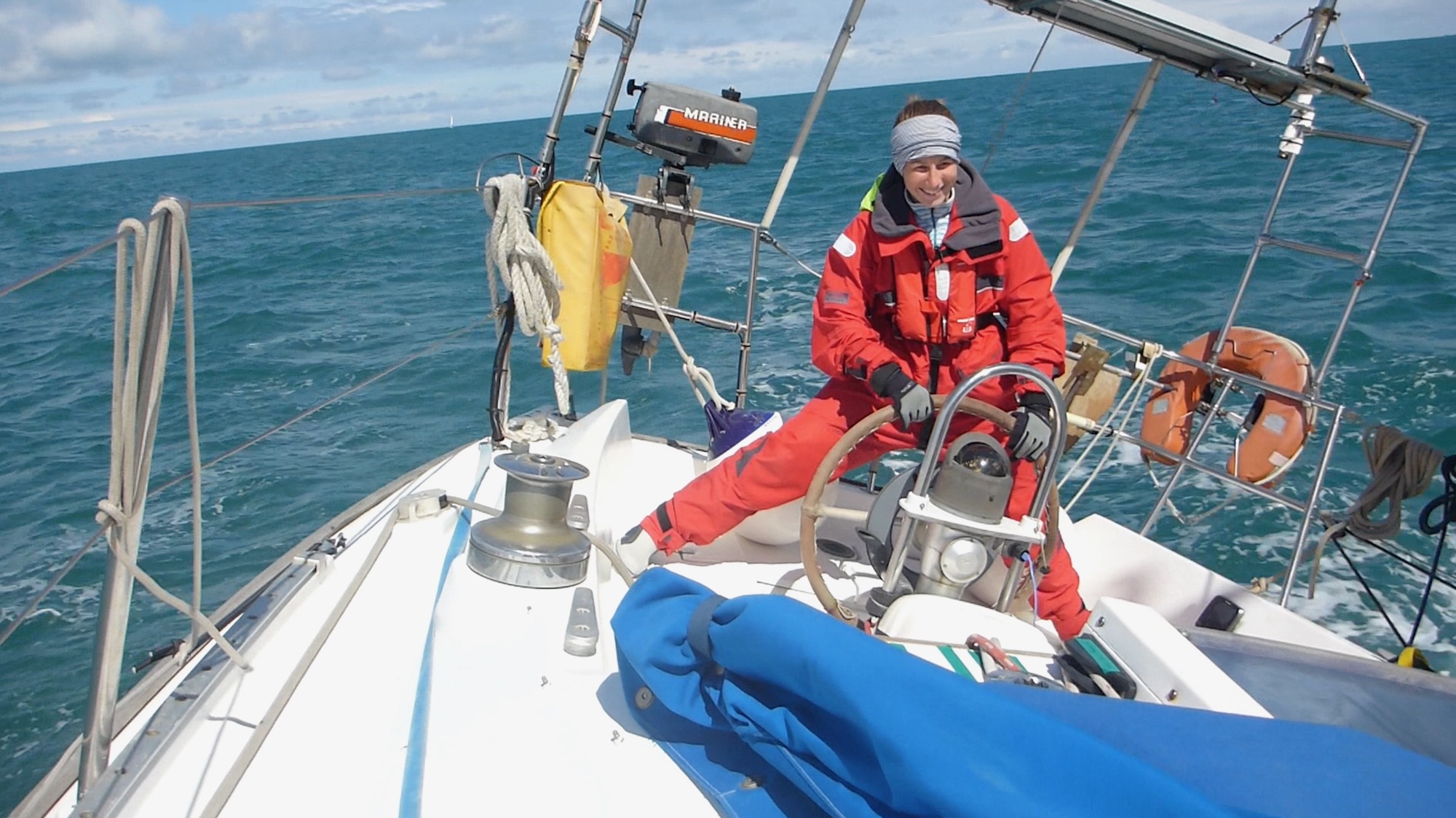
Tip: if you feel like you're starting to feel queasy, go on the helm - it helps distract you, you'll get some fresh air and you can focus on the horizon.
Is Living on a Boat Like Glamping?
I moved on our boat half expecting it to be just like glamping.
We camped a lot in the past when we still lived on land and enjoyed getting back to nature. I thought living on a boat would be a lot like camping but with a fixed bed, your own bedsheets, a toilet and cooking facilities onboard… which to be honest, is basically pretty much what it is on a small boat.
On a bigger boat with more mod-cons, it’s just like living in a very small house that you can move.
But, living on a boat is so much more than just that.
You have the freedom to move whenever you want to (weather permitting) without having to pack your whole campsite away. It all comes with you. Yes, you need to tidy up and stow everything away first but it’s so much easier than having to roll up the bedding, deflate your air mattress, store all your cooking equipment away into a plastic box, pack away a tent into a tiny little bag and then somehow fit it all into the boot of your car or van.
A lot of boats these days have running water. For our first two years of living on a boat, we only had foot pumps that provided cold water and no shower onboard. We learned to adapt to our new circumstances and began to heat water in a kettle on the stove when we were on the mooring or out at anchor. If we stayed in a marina then we used an electric kettle to heat water. We went ashore and found showers to use and learned to really appreciate a good hot powerful shower, something that you take for granted when you live on land.
On our second boat, we had a water heater, taps that didn’t need a foot pump to use them and a shower and to be honest, we miss our foot pumps. We could be a lot more careful with the amount of water we used and could make our supply last longer. Being able to shower on the boat with hot water was a total game changer – especially when Erin arrived and couldn’t be left long enough for me to walk up to the marina shower block to have one on land.
Travelling from anchorage to anchorage is so much more freeing than sitting in a hot stuffy car on the road with every man and his dog doing the same (on one of the few weekends a year you actually have weather nice enough to go and camp).
When you arrive at your new anchorage, your bed is already made for you, the cooker can be used en route if you want food on passage, the toilet is open and ready for use whenever it’s needed – no need to stop at a service station along the way (though it can be interesting to use when you’re heeled over but it’s all part of the fun).
And the best bit – you can pick the perfect spot to drop your anchor, exactly where you want it. You can choose to be as close to or as far away from other boats as you want and the perfect distance away from the shore. How many times does that happen when you go camping or glamping? Most of the time you get told which pitch you’re on, or if not, you end up with other people setting up camp much closer than you’d like. The majority of boat owners are courteous and leave a decent amount of room between boats to allow for room to swing when the wind or tide shifts but, of course, there are always the odd few to keep your eye on.
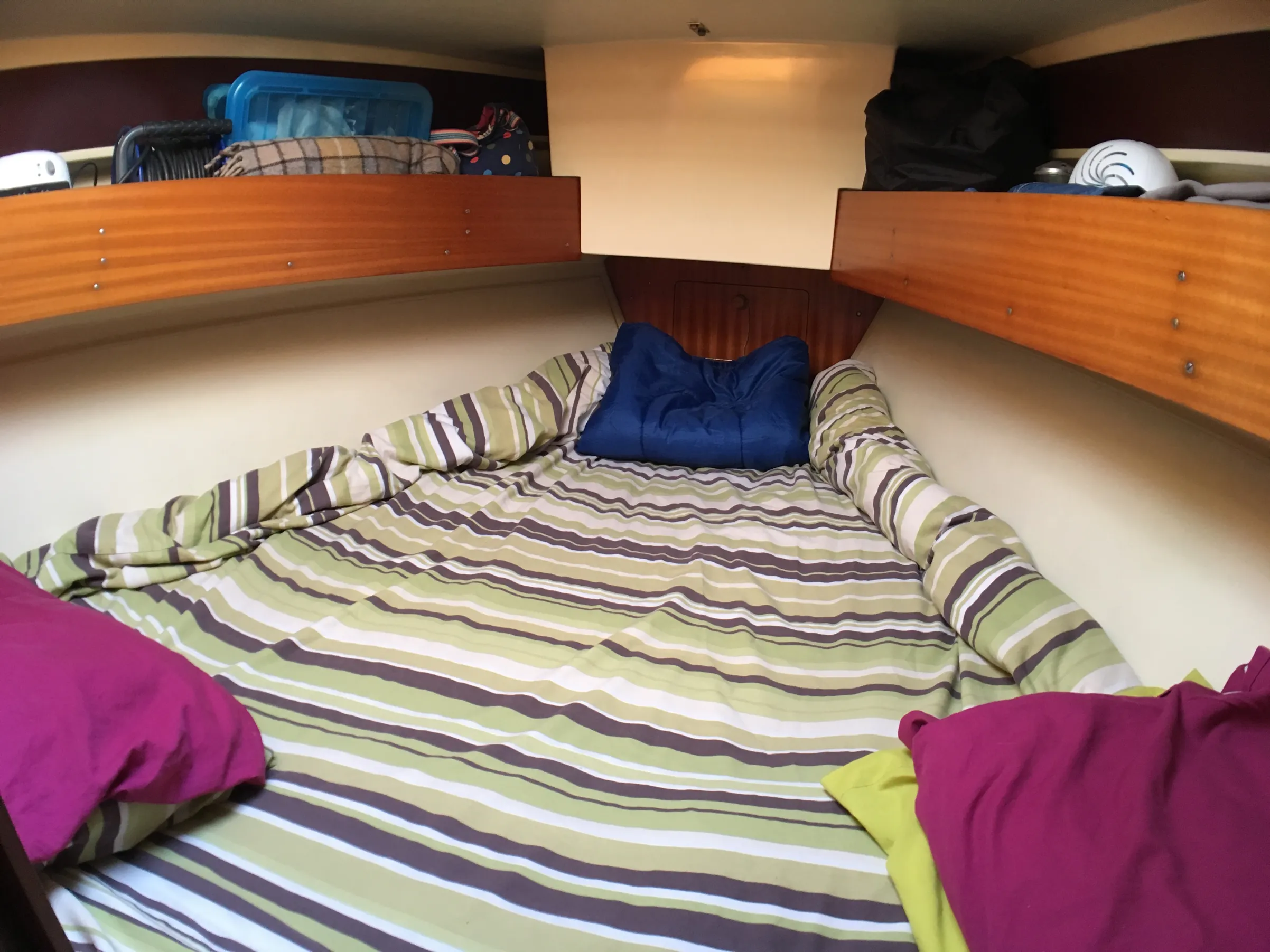
A ready-made bed to climb into either at the end of your passage (or during if it's a calm one!)
What's the Difference Between Summer and Winter Onboard?
It's like it is in a house but more pronounced.
You'll notice the elements more than in a house. You can hear the rain beating down on the cabin top. The wind will physically move you around and tip you over at times. The sun will fill your boat with warmth (sometimes too much closer to the equator!).
Life onboard a boat in the summer is a lot more comfortable. Getting ashore is easier - you're much less likely to get soaked during a dinghy ride by rain or waves (there is nothing worse than walking around in wet pants in my opinion - it makes me grumpy as hell). You can go for walks through the countryside to little pubs. You don't have to wear as many layers when out sailing or deal with as much bad weather that you have to shelter from.
Can You Live On a Yacht In The Winter?
Life onboard a boat in winter is a lot harder but it's definitely possible - we spent five winters living aboard!
Some days it may be impossible to stay onboard if the weather is bad enough. We had to escape to a nearby cafe on a few occasions while in Jersey as the boat was moving around so much. We were near the marina entrance and the motion caused by the waves coming in and 50-knot winds made it unbearable to be aboard.
Be prepared for everything to get wet and mouldy and for it to be cold. I HIGHLY recommend having a good-sized dehumidifier onboard. The amount of moisture it will suck out of the air is incredible and makes SUCH a difference to your comfort levels. You'll also need a heater.
How Do You Heat A Boat In The Winter?
We had an oil-filled radiator on the first boat. On the second boat, we had an electric fan heater and a Chinese diesel heater. They were used almost every single day over the winter as well as running the dehumidifier almost all day every day. By sucking all the moisture out of the air, you'll notice a difference in the air temperature - it will feel warmer even without using heating.
Although we used heating and the dehumidifier every day, it cost us a lot less to run them than on land because the space we were heating was much smaller. We were very comfortable onboard, maybe even more so than when we lived in our house.
How The Weather Affects Life Onboard
I didn’t realise just how much the weather would affect our daily lives on a boat before we moved aboard.
It’s so easy to shut the curtains, turn the TV on and forget about the world outside when the weather is less than ideal in a house. On a boat, that is not an option.
It goes back to safety again. You have to check what the weather is doing regularly and know exactly what’s predicted so you can make sure that you are anchored in the most protected spot. (Ie. You do not want the wind to be blowing you towards the shore (be on a lee shore) in case your anchor fails as you will end up on the shore and your boat may end up on the rocks or the beach and be damaged beyond repair).
If you can position yourself somewhere with protection from the land, it also makes for a much comfier experience. Wind makes a boat move a lot wherever you are – marina, mooring, or anchor (especially if you have a high freeboard as it acts like a sail at anchor so you get blown from side to side).
Wind also makes waves build which means you will be bobbing and rolling around too. It isn’t a pleasant experience (think feeling seasick at anchor sometimes) so it’s a lesson that is quickly learned – find good protection when bad weather is on its way.
Knowing what the weather is doing is also vital for passage-making. You want the wind and waves to help you get to your next destination, not hinder you or make it a very uncomfortable experience.
When your dinghy is your car to get ashore and get supplies, what the weather is doing will affect when you choose to go out in it to do chores. A sunny day with little wind and flat seas vs rain, lots of wind and building seas when you’re in a small blow-up dinghy… what would you choose? It’s a completely different ball game to just jumping into a car on land.
You spend a lot of time outdoors on a boat as there generally isn’t much room below decks so you are out and about exploring your surroundings or sitting in the cockpit.
Dave and I are sun worshippers and much prefer warmer weather which is why we left the UK and headed south. It’s been a lovely change to have warm winds when we’re out sailing instead of the cold wind we got ‘used’ to (learned to accept more like) in the UK and Northern Europe.
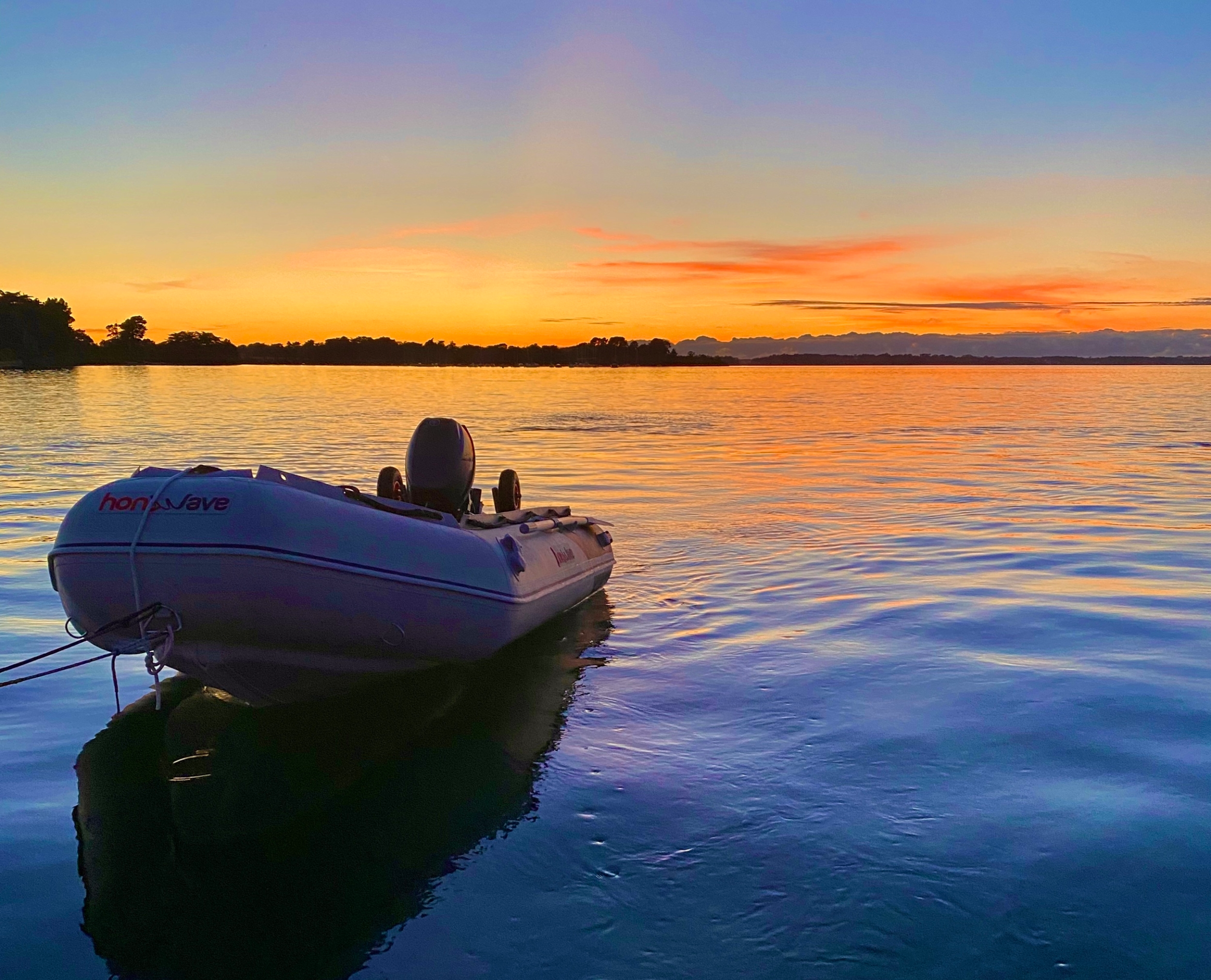
It's a lot easier to go ashore or get boat jobs done when the weather is like this and the seas are flat calm!
Family Life on a Sailboat
Boundaries Become Really Important on a Boat
If you decide to become full-time cruisers, you will end up spending a LOT more time with your family.
We both worked full-time on land and as we both found this harder and harder to do (60-70 hour working weeks are NO fun), we both went part-time. This allowed us to get used to spending more time together in a relatively large space before moving on board into a very small space.
I highly recommend setting up boundaries when you move aboard to make sure you both/all get ‘you’ time. It is so important to make sure you look after yourself so that you can work better as a team. We’ve found out the hard way that not taking that time makes life more difficult and stressful.
It’s not always easy to get off the boat if you’re not in a marina (dinghy stowed away on deck or in the locker) and sometimes the weather can literally trap you down below decks together for days on end. Something to get used to for longer crossings.
On the flip side, we love that we get to spend so much time with each other and had the opportunity to be able to watch Erin grow and change every single day. We realise how lucky we are and cherish our time together. (Not so much the screaming fits but then who likes those?!)

Lots of smiles as we had just arrived at A Coruña in Spain after crossing the Bay of Biscay. It meant 1) we had survived and 2) we could get off the boat again!
There's a Real Lack of Privacy
It’s time to get used to sharing. On a boat, you can hear everything. And I mean everything.
Going to the toilet is not the private experience it used to be. You will get to know who you live with very well indeed, put it that way. So, I hope you really like whoever you choose live on a boat with!
A good pair of headphones are a must in my opinion and a door or curtain you can shut when you just want some time out on your own (which I believe is essential).
Going out exploring or for a drink on your own is good too when you just need to get off the boat. It happens. Boats can be your safe little cocoon haven or they can be a pressure cooker. It just depends what mood you’re in.
How To Educate Children On A Boat
You have four options.
1) Stay living in the same area and enrol your kids in the local school.
2) Flexi-school where they go to school part-time and you home-school/unschool the rest of the time.
3) Homeschool.
4) Unschooling.
Erin was aged 0-2.5 when she lived onboard. During that time she was obviously too young to go to school but we did enrol her into a Portuguese nursery during our winter up the Guadiana River for five/six months.
She'd spent the first almost two years of her life with at least one of us constantly so it was tough for her (and us!) to begin with but she adapted quickly. She needed it. We needed it.
As a result of her time there (and the other Portuguese nursery she attended in Central Portugal), Erin now speaks and understands a LOT more Portuguese than we do and she was able to improve her social skills massively.
As she was born just before COVID-19 hit, she had spent very little time with other children and she actually ran away from a little boy who approached her in a playground when we were in Spain. We knew she needed the opportunity to socialise with people other than us so made the conscious effort to enrol her as soon as we could.
Before she started nursery, we spent a lot of time each day 'teaching' her and playing with her as we had the time to. My degree is in Primary Education so it was good to use it towards some form of teaching. However, you don't need a degree to homeschool. There are plenty of programmes you can follow, or, you can choose to follow your child/ren's interests and 'unschool' them.

Our daughter on her way to nursery in Portugal after we enrolled her while we stayed in one spot for six months.
How Much Does Living On A Boat Cost?
How Much Does It Cost To Buy a Sailboat?
How long is a piece of string?
You could source a boat that is in dire need of some love, time, money, and upkeep spending on it for very little money if not free.
At the other end of the scale, you could buy a boat for hundreds of thousands if not millions.
You could also build your own boat to your own specifications. (Be warned, this is highly likely to take years of your life and it may not ever get finished.)
You could buy a boat outright or get one on finance and pay monthly for it. We chose to buy our boats outright as we wanted to minimise our outgoings each month but that was what worked for us. What works for you may be something completely different.
Make sure you budget for outfitting any boat you buy if you intend to take her sailing, especially if you decide to go offshore.
Also, you'll need to set aside money for ongoing maintenance. Things WILL break on a boat, it's a matter of when not if. We preferred to try and keep on top of maintenance rather than fix things when they broke (and broke other items too when one part failed).
Major items like standing rigging need to be changed every decade or so depending on the environment it's been used in and how hard the boat has been sailed. This will be a major expense and the cost of replacement doesn't go up in a linear line the longer the boat, it's more like the cost quadruples. Another thing to take into consideration when choosing a boat is the ongoing costs of maintenance.
Use a Boat Maintenance Log Book to keep track of any jobs that need doing onboard. It's invaluable for keeping on top of things and making sure nothing gets missed.
What Are Your Monthly Outgoings When You Live Onboard?
It can be so much cheaper to live on a boat rather than land BUT it can also easily cost more so you have to be careful.
Living on land (in a typical house/flat etc), there are a lot of almost inevitable bills... Rent/mortgage, gas, electric, water, council tax, home phone, broadband, mobile phone, TV license, maybe even SKY TV or similar, monthly car payment, car tax, car insurance, petrol/diesel to run your car etc etc. The list goes on.
We cut down as many of these as possible while we were saving up and planning to leave but we still couldn’t get rid of all of them. We worked out that pretty much one of our wages each month was dedicated to just paying the bills and part of the other one covered unexpected bills that came up. Insane. We literally went to work to pay the bills.
Once we moved onto the boat, life became a lot simpler (and cheaper). We deliberately chose to buy a boat that we could afford outright as we would be living off savings and wanted to minimise our spending each month so they’d last longer.
Anchoring is free (the majority of the time).
Gas on tap became a gas bottle that was replaced whenever we ran out every three weeks or so when it was a small bottle. On our second boat, we had bottles double the size so they'd last twice as long.
Electric was provided by our solar and wind generator for free. If we were in a marina then we’d plug in and use the electric that was included in the price to top the batteries up.
Water was topped up for free (in the majority of places, very occasionally we'd have to pay for water).
Council tax, gone.
Home phone, gone.
Broadband was replaced with data from our phones and then a rolling monthly mobile broadband contract.
Mobile phones we kept.
TV license, gone.
Cable TV, gone.
Our cars were sold so we didn’t have all the costs that come with running a car (and we worked them out to be hundreds of pounds a month). We do keep a small amount of petrol onboard for the outboard engine but we use a fraction of what we used to in our cars.
We went from spending 000’s a month to peanuts.
However, if we motor rather than sail or spend time in marinas rather than anchorages then our costs go up. But, it’s our choice to do that. We choose whether to pay those costs or not. You can’t say that about your council tax or water bill let alone the rest. Living on a boat has been SO much cheaper for us. If you do it right, then it could be for you too.
How Much Does It Cost To Insure a Boat?
One other cost to consider is boat insurance.
We paid for it for our two boats for peace of mind but when we needed it, we chose to pay out of pocket as we didn't want a small claim to affect our premiums... Seeing as a lot of marinas require proof of insurance, whenever we get another boat, we'll end up getting insurance again.
We went with two different companies over the years: Pantaenius and GJW Direct.
For us, GJW Direct was cheaper than Pantaenius and we had a better experience with the customer service. That may not be true for everyone but it was our experience.
When we buy our next boat, we'll more than likely go with GJW Direct again as we had a good experience with them last time. You can ring up and extend your cruising ground as needed during the year and pay a small amount if you need to rather than selecting a giant cruising ground that may not be used.
In terms of cost, Pantaenius was around £450 per year for our first boat (a 1974 Dufour 34) and £960 for our second (a 1989 Hallberg-Rassy 42E) and GJW Direct was closer to £600/700 for the year for the Hallberg-Rassy.
It's a Simpler, Slower Pace of Life
One of the reasons we moved onto a boat was so that we could slow down our pace of life.
We were both like tightly coiled springs to start with because of our jobs and we slowly began to unwind and relax more. Living on a boat made us so much more chilled out than we used to be. Adding Erin into the mix probably didn’t help our quest for zen but we had been talking about having children for years, we love her to bits and no one ever said that having kids was easy. We've noticed our stress levels are much higher again now we are living back on land, we need to get back on a boat again, stat!
Living aboard, our pace of life was a lot slower than it used to be living on land. We could take our time doing mundane tasks like doing the food shop (which I think is a lot more fun in a foreign supermarket anyway), we couldn’t fill up our water tanks any quicker than the rate it came out of the tap, and we walked to the majority of places we visited as we didn't have a car.
Walking somewhere that’s an hour each way is nothing to us now. Food is cooked from scratch on the boat a lot of the time as we don’t have a freezer onboard for quick and easy ready meals. Washing has to be taken to a laundrette (or done onboard in a bucket then hung up on the guard wires between the stanchions), we can’t go far from it and it takes up a lot of the day so we tend to let it build up and then do it all in one go. Sleep is when we feel like it. Work and boat jobs were done when we got up in the morning and were worked around Erin.
We didn’t have all the worries that we did back home when we were on a boat.
Generally, it’s other people who stress us out and cause problems. We’re lucky in the fact that we get along quite well together 99% of the time. The other 1% of the time, it’s outside influences that stress us out that aren’t run-of-the-mill day-to-day things (like selling our house and first boat). Not having a mortgage and big bills each month nor having to deal with going to work off the boat makes life a lot simpler.
I couldn’t imagine going back to the pace of life we used to lead – it made us both ill. However, I think a lot of people believe that we spend all day lying on a beach and that just isn’t true. We rarely had beach days. We just don’t have time for that as there are always so many other things that need doing and everything took longer to do. So a slower pace of life, yes, but it’s still full of things to do on a daily basis.
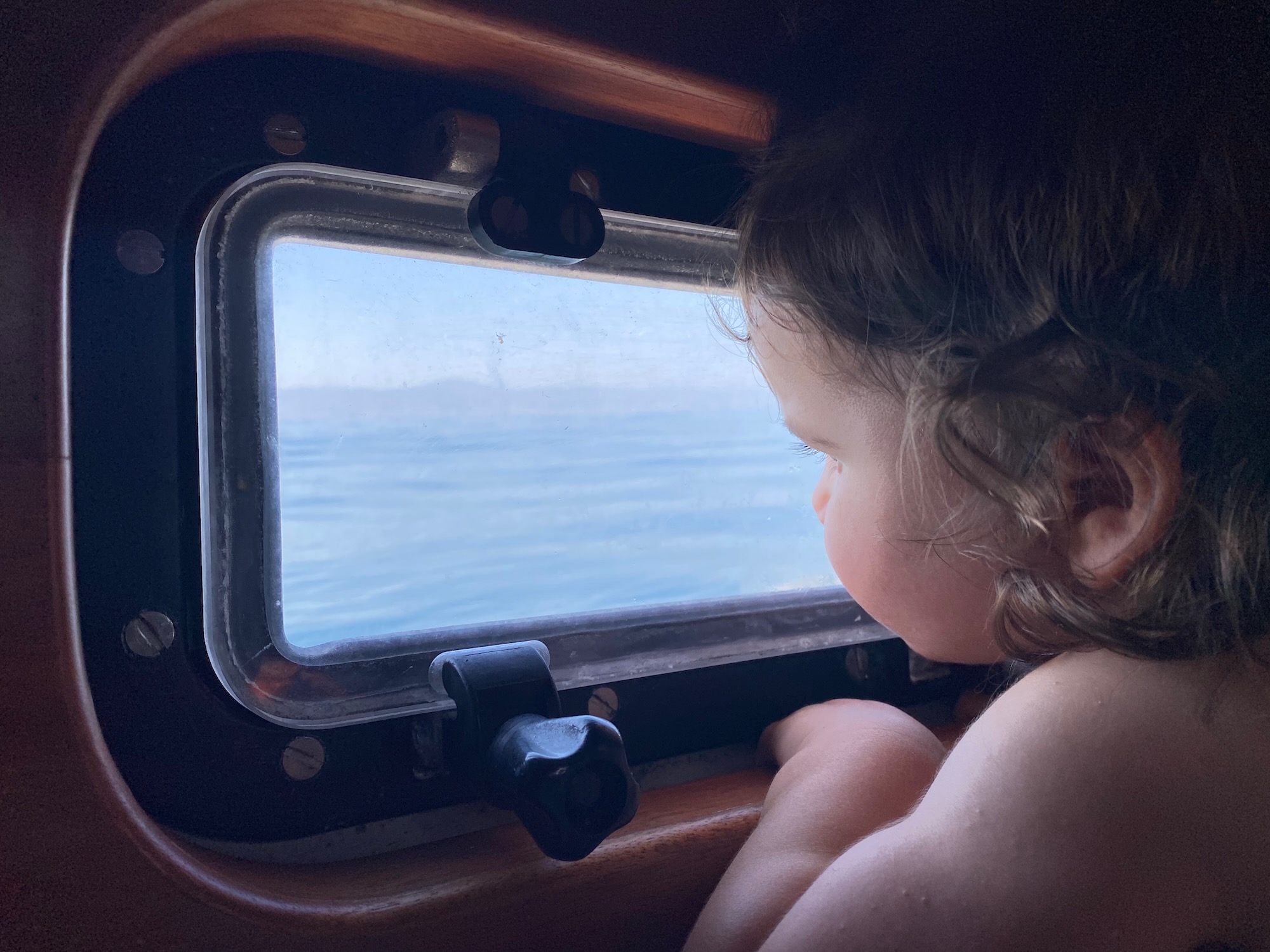
You have time to slow down, take a breath, and enjoy the view out the window when sailing. Our daughter spent hours doing this on passages and literally climbed up the back of the sofa into the bookshelf so she could see out!
How Important Is Freedom To You?
Living on a boat brings a real sense of freedom and adventure.
One of the real perks of it is that you can move your home whenever you feel like it.
Bored with your surroundings? Find a new anchorage. Are your neighbours annoying you? Try somewhere different away from other boats. Want to go and visit a new city or group of little islands that are a few miles away from the mainland but feel completely isolated and like the British version of the Caribbean? Do it! Pick your weather window and sail away, off into the sunset.
Picking up the anchor, raising the sails and sailing off towards the horizon on your own timetable feels incredibly freeing and like you’re off on a real adventure. You never really know what you’re going to come across or the wildlife you’ll see.
We are regularly treated to dolphins swimming on our bow as they ride the waves we create when we’re sailing along through the water.
One night in particular when we were sailing down the west Portuguese coast was mind-blowing!
It was dead calm so no wind, waves or even ripples on the surface of the sea and we were motoring. We had dolphins appear and begin to ride the bow wave. What blew our minds was that the water was glowing as we ploughed through the sea and the dolphins swam along beside us.
We were disturbing an algae bloom of plankton and every movement in the water caused them to light up bright blue in a natural phenomenon called bioluminescence.
Every now and then, we’d go through a shoal of fish and they’d scatter in all directions lighting up the sea like a firework explodes in the sky. You’d see the dolphins zoom off to catch one before coming back to the bow.
I think I sat on deck watching it for about an hour before I had to go down and get some sleep before it was my turn to go on watch.
Living on a boat can truly be absolutely magical.

This never got old. I could spend hours watching dolphins on the bow of our sailing boat during a passage.
Other Questions About Life Onboard a SailBoat
What Do You Call People Who Live On Boats?
Apart from geniuses?!
People who live on boats full-time are affectionately known as 'liveaboards'.
Why Do People Live On Boats?
I'm sure if you asked all the liveaboards in a marina why they decided to live on a boat, they'd all give you a different reason.
Maybe because they wanted to live a life that was more connected to nature and the environment?
Perhaps to save money so they could buy a house?
It could be because they have separated from a partner and had nowhere else to go other than their yacht?
Because they wanted to live a more relaxed way of life?
Personally, we chose to move onto and live on a boat so we could travel our world slowly in a sustainable and more environmentally friendly way. We wanted to dig into the places we visited and see them from a different point of view. Believe me, arriving somewhere by boat compared to any other form of transport makes you see it in a completely different light. We wanted the flexibility to set sail when we chose to (weather permitting of course) rather than when we could find a cheap crossing on the ferry. It was the best decision we've ever made and has opened our eyes to a completely new way of living.
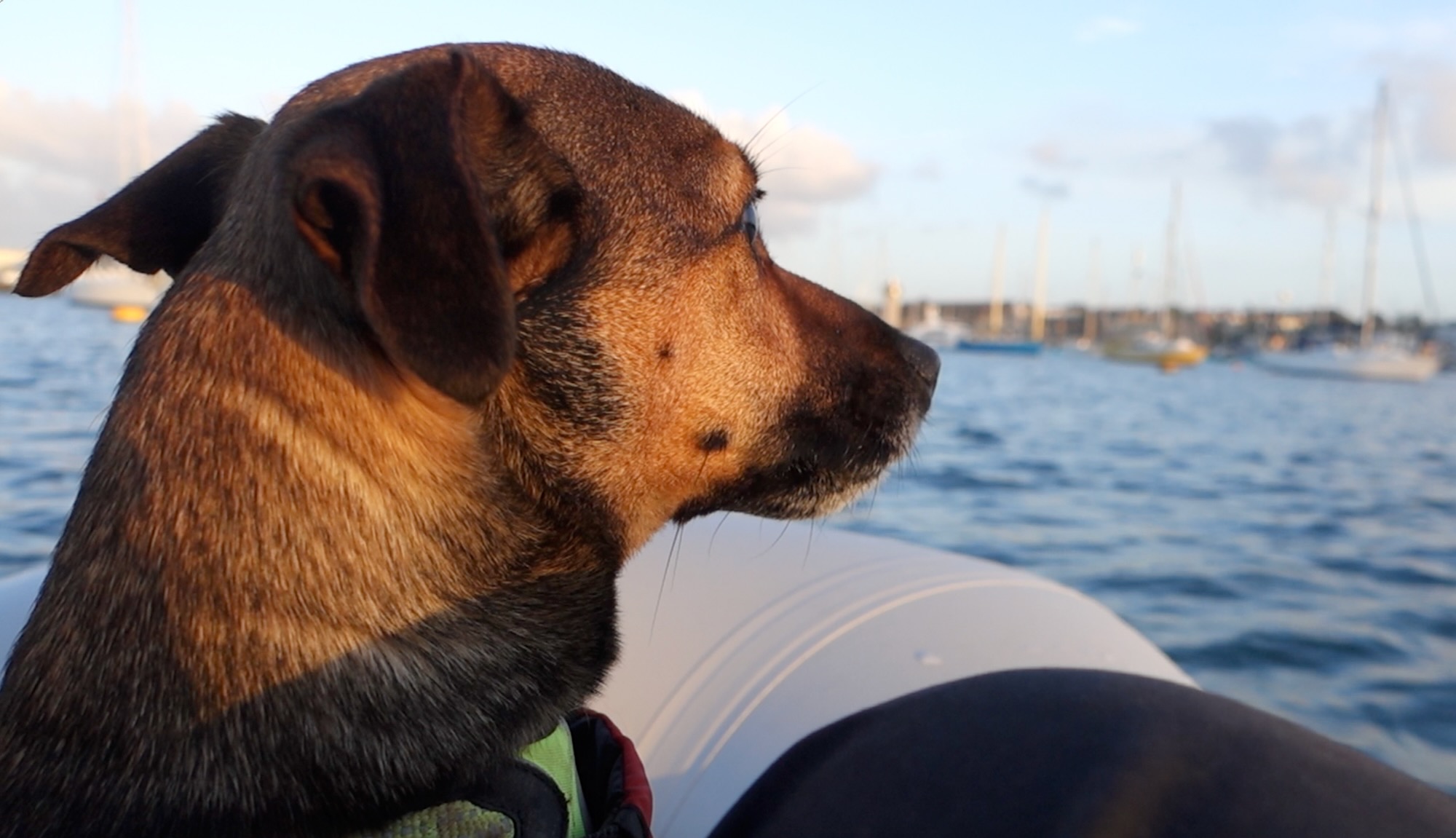
Why Did We Stop Living On a Boat?
After five years of living on a boat full-time and being on the move for half of that, I was desperately craving some stability both mentally and physically.
I knew I wasn't ready to go back to the UK straight away so we decided to stay in Portugal and try to settle there as I had fallen in love with the country. We lasted 18 months in an apartment before coming back to the UK as we were really missing boat life, and spending time with family. Unfortunately, Portugal just wasn't giving us what we needed (though it will always hold a special place in my heart).
Now we're back, we're working on re-establishing ourselves back into society and finding work that suits the new versions of ourselves. The problem is we now have salt in our veins and are missing the water even more so it's highly likely that we'll be back by the coast before too long, working in the sailing industry, or even back on another boat.
Once you've lived on a boat for any length of time, you'll find it changes you to the core. Be prepared to have your life changed upside down if you choose to follow your dreams.
So What Is Living On A Boat REALLY Like?
So, when you move onto a boat, it’s a little bit like glamping but so much better.
You learn to really appreciate the small things like hot running water and you really value the possessions you have onboard as they will have been specially selected to be there as storage space is at a premium on a boat.
The freedom you feel when you pick up your anchor and go to sea is incredible. Seeing wildlife in their proper habitats is magical – I don’t think having dolphins on our bow will ever get old – especially when they make the sea light up and glow as they move through the water.
It takes some adjustment to get used to living in such a small space. You need to make sure you have time apart for your mental health and take responsibility for all your actions and safety when on a boat.
Everything slows down on a boat, it can be much cheaper than living on land and you can be as isolated or as social as you want. I’ve found other cruisers to be far more social than our old neighbours back home as everyone has more time for you – and you’ll always hear some great cruising stories when you get together. You’ll be telling them yourself before too long.
It really is no wonder that people fall in love with living on a boat and the cruising lifestyle. We have. When we left originally in June 2017, we both had two-year career breaks from our jobs. We ended up living aboard and travelling for five years before returning to land, although we decided to live in Central Portugal and experience life on land in a foreign country before finally returning to the UK at the end of 2023.
The problem we have now is that 'normal' land life just doesn't appeal to us anymore. We've come back as changed people and couldn't go back to our previous life. We've spent a lot of time talking about what we want from life and we're both REALLY missing life on the water. We'll be back on another boat before too long. Watch this space!
We had far too much fun living on a boat, travelling and exploring our world, and experiencing different cultures and climates along the way. Living on a boat was so much better than we originally anticipated and I can see why more and more people are giving up land life for a life at sea.
Does living on a boat sound like what you expected it to be like? What are your plans for moving aboard a boat and heading off into the sunset?
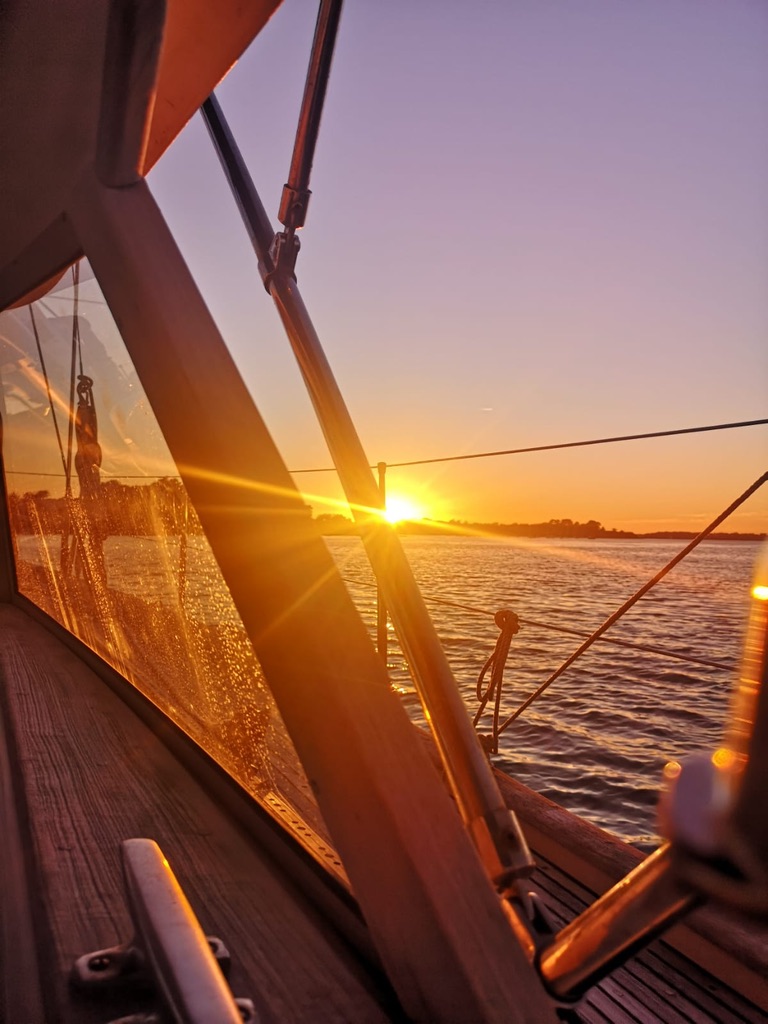
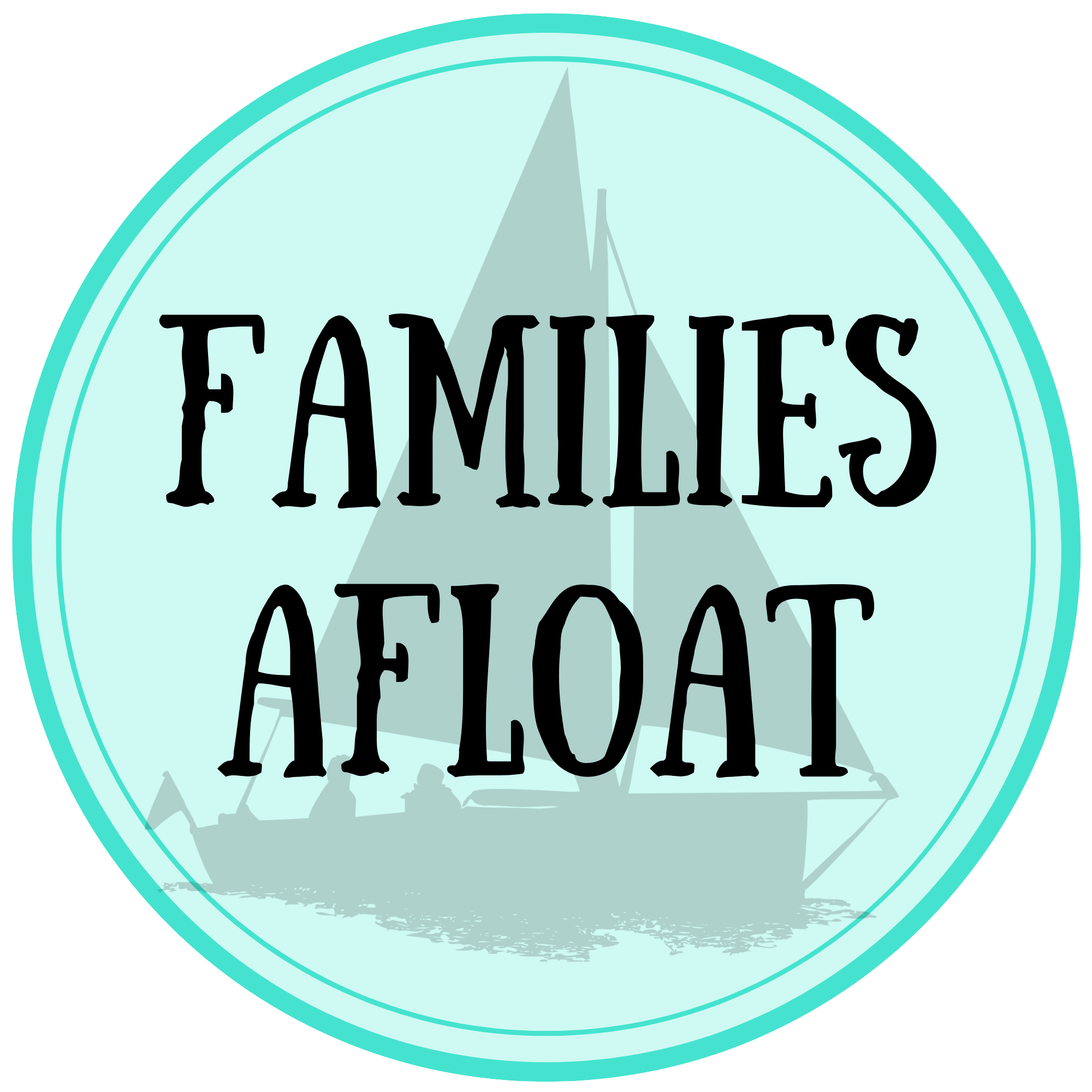
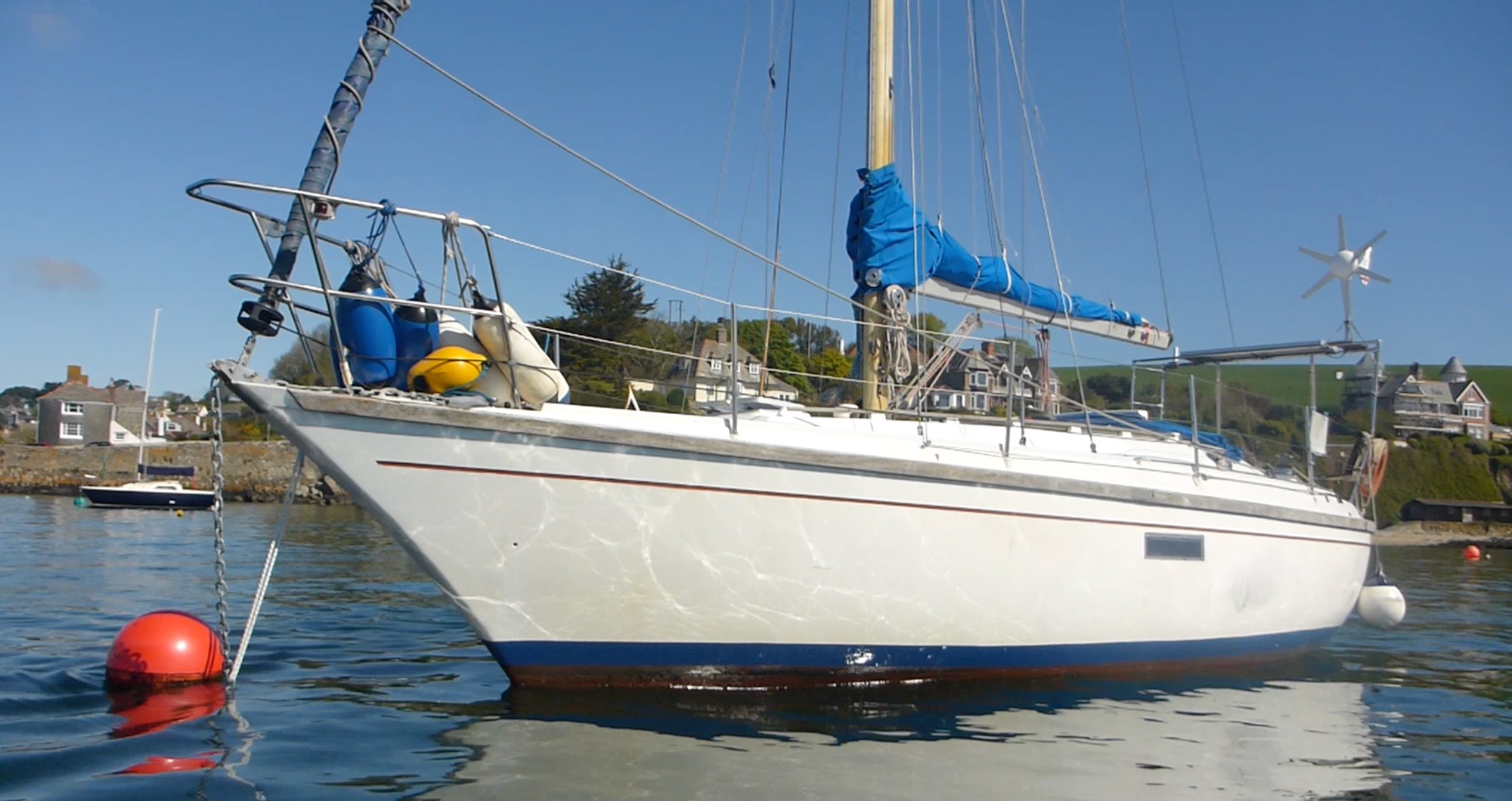
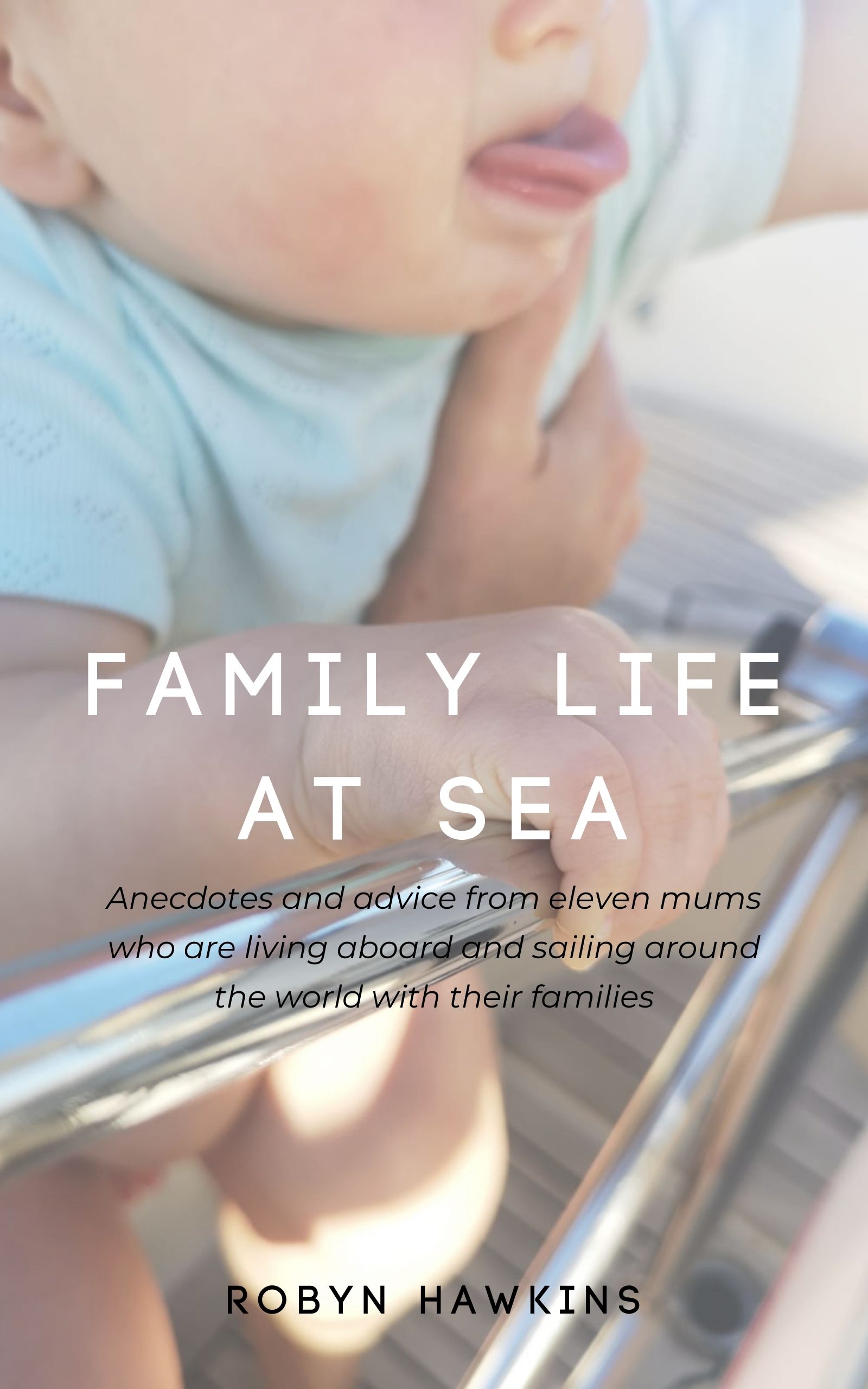
0 comments